#and each section starts with a track that's relevant to his character
Text
come under the cut with me as we take a look at the music of rgg
Introduction
Before getting into specifics, let’s talk about general form and function - the things (nearly) every track we touch on will have in common. All these tracks are battle themes and not just battle themes but final boss battle themes. This puts them in a unique position in relation to other tracks on the OST, as they are all intended to be heard once and in the final section of the game while also being memorable and impactful. Where other battle music can be more generalised, intended for random encounters or no-name bosses (sorry Kashiwagi), final battle music has to be tailored to the final fight. This probably goes without saying, but it’s still an important thing to keep in mind when listening.
Video game music operates in much the same arena as movie music. The main differentiating factor being that while movie music generally succeeds when it goes unheard, video game music generally succeeds by being heard while augmenting the action on-screen and offering one piece of a memorable experience. That is to say, all these tracks are intended to be dynamic and loopable first and foremost.
I want to lay out a couple of things to get yourself in the mindset of a purposeful listener, as well. When you listen to the music you want to do a broad listen first, and then more close and careful ones. Ask yourself, how does this make me feel? Is the music cold? Is it warm? Is it joyful? Is it sombre? And so on. Even without any knowledge of how to “properly” describe the techniques or even the sound itself, within the conventions of film and/or video game music, as we understand it, you should be able to intuit at least one part of the whole emotionally. After emotion you want to listen for instrumentation and texture. Texture in this case is how “thick” or “thin” a piece of music is – the more layered instruments and sounds the more thick the texture. The instrumentation itself can also impart a meaning, is it largely guitar-based? Piano? Orchestral? Acoustic or electric? Analogue or digital? Does the instrumentation fit a certain region ie: is it using only Western orchestral instruments or things like a sitar, shamisen, steel drums, etc that may invoke a specific place.
Once that is finished, you can look to the setting itself. What is going on on-screen, what do we already know about the characters being depicted, and how can the music tell us more about them? Hopefully, in the analysis that follows I will be able to give you a few nuggets of this information and open you up to trying to find your own angle, if you feel so inclined. I can only give one reading, lest we be stuck here for eternity, but that doesn’t mean the reading I give is the only valid one. Any timestamps refer to the official soundtrack, though the in-game versions will be discussed and the accompanying visuals discussed when relevant.
I would suggest listening to the tracks herein discussed prior to reading. The OST versions will be linked, but I would suggest watching video of the final fights as well, if you would like to do your own reading. Attempting to listen as you read will make it much more difficult to really listen and far too often music is used as something to fill space without any attention paid to it.
For Whose Sake
OG1, K1, 0
Without further ado, let’s get started with our first ever RGG boss - Nishikiyama. Not counting Ishin, as Izo is a different character, Nishkiyama’s theme has three main iterations. The original, Kiwami, and 0. Each of these are variations on one another, as the main melody and chord progression remains the same throughout, and they all say different things about Nishikiyama and the conflict at hand.
Nishikiyama’s theme, For Whose Sake, ultimately, acts as a parallel to Kiryu’s in Receive You much in the way his character does. The melodies are similar, but divergent, to underscore their shared beginnings and their distance by the end. The opening interval in both pieces is the same and it can be heard throughout the soundtrack of the original PS2 game, a constant that ties he and Kiryu together regardless of what point in the story one is.
In its original iteration, Nishikiyama’s theme’s melody is constrained entirely to a chorus of synth strings with no clear singular leading instrument. He is not as much of a standout as he wants to be. Like the ill-fitting suit, the melody isn’t really his. It’s impossible to know if he cannot exist without Kiryu or the other way around. Acoustic guitars fill out the rhythm section, while most of the rest of the soundtrack is inundated with electric guitar. This acoustic spin lends a more intimate nature to the music compared to its more bombastic counterparts, stripped down, reminding us this is a more personal battle. A waterfall of synths breaks up the main melody before returning to begin the loop again. Like his irezumi, Nishikiyama sits at the top of the falls, but he’s never able to crest them.
0 takes a step back, stuttering the entire melody to the point that no one note flows to the next - barely a spray of mist on a river. In 0, Nishikiyama is not yet fully the Nishikiyama from the first game in neither temperament nor status. Not only that, but his fight is against Majima, a man with whom he has no history and no real solid link. There’s no reason for the melody to be intact.
Kiwami moves in the opposite direction, making this theme much more cinematic, almost grandiose. Giving the melody to french horn, with strings taking the backseat and hardly any synth, Kiwami presents Nishikiyama in a more focused light. Fitting, as it also adds multiple scenes featuring him throughout the game in between chapters. However, this does somewhat undercut the rest of what I previously mentioned. A more open and sweeping orchestra sounds more impressive, but narratively for Nishikiyama it’s fluff. The waterfall motif is also removed, for some reason, leaving it somewhat of a shell.
Some of these decisions may partially be hardware-based, with the later games becoming more complex texturally. Interestingly, Y1 starts the intro to For Whose Sake in the cutscene before the battle, with it creeping in while Kiryu and Nishikiyama talk about finally deciding to settle things with a fight, while K1 forgoes starting the theme until the lead-up to the dynamic intro. In my opinion, this also puts a larger wall between the two narratively than is originally presented.
pt2 here
#first three games are done#will work on the next couple and probably not post those until after 8 dies down and we can focus on other things again haha#part 2 will be up and i'll link i just don't want this to be gargantuan
7 notes
·
View notes
Text
Who Shot Gum E. Bear? by Damon L. Wakes
============= Links
Play the game
Walkthrough of the game, curtesy of David Welbourn
See other reviews of the game
See other games by Damon
============= Synopsis
Gum E. Bear lies dead in a pool of his own liquid centre, and only Bubble Gumshoe - private eye extraordinaire - can deliver sweet justice on the rain-sticky streets of Sugar City. Explore the area, seek out clues, interview suspects, and finally ACCUSE the murderer. But be careful: you only have one shot...
============= Other Info
Who Shot Gum E. Bear? is an Inform parser game, submitted to the 2022 Edition of the IFComp. It placed 37th overall.
Status: Completed
Genre: Detective, Parody
CW: violence, sex and drug use, all involving colourful candy characters.
Note: one location is an Adult [Candy] Bookstore. Some candy on candy cannibalism.
============= Playthrough
First Played: 2-Oct-2022*
Last Played: 25-May-2023
Playtime: around --
Rating: 3 /5
Thoughts: Who Shot Roger Rabbit? but make it sweet and sticky.
*I had reviewed the game during the IFComp in the Author's section (which was hidden to the public). I forgot to keep track of the notes I gave though... You can find the OG review under the cut.
============= Review
You are Bubble Gumshoe, a detective on the scene, tasked to solve the murder of Gum E. Bear. This funny parody of a detective mystery will leave you with a sweet tooth, or a cavity...
Spoilers ahead. It is recommended to play the game first. The review is based on my understanding/reading of the story.
Preface: I am not good at parsers. Thinking of actions to do is often very frustrating, and even if I love puzzles, parsers are not always fun for me. Anything without a walkthrough or a hint mechanism tend to be DNF'ed.
The walkthrough linked above was not available until January 2023.
Replaying a puzzle game or mystery game is difficult, especially when you know the solution. What is enjoyable is trying to catch all the little details you may have missed in the first round.... which was a lot in my case. The first time I plated WSGEB? I accused the first person I interacted with out of frustration and won the game. Soon after I started again, tried some different commands, accused someone else, and called it a day. Still, there was quite a bit I missed.
As Bubble Gumshoe, you get to investigate clues around the body, examine the 3(5-ish) other locations, ask questions to the NPCs in each spot about clues or other people (or some other semi-related topic). And finally accuse who you think killed Gum. There is also a small puzzle to unlock a room.
The whole concept of parodying murder mystery by setting it in a Candy-land world is honestly hilarious to me. The game really goes in the tropes of the noir-themes, with the hard policeman, the femme fatale, the mafioso hidden behind a locked door. Amidst the puns galore, the dark and gruff background is contrasted by the very sweet names and humourous descriptions following an action (trying to taste everything, even myself was very funny - light cannibalistm).
After a few action, the header displays different bits of text, either related to the setting (It’s always nighttime in Sugar City.) or about how to play (telling you to smell or taste things). But I think there are only 3-4 variations before it repeats itself...
If you are in a location with a named NPC, every time you input an action, that NPC will do something (Officer Donut will click his pen, Candy Kane tries to mix some cocktails...). Those are funny little details, especially when you remember all those NPCs look like some sort of candy.
My main gripe with the game is how obvious who the murderer is: the only person who can hold a gun. And while you can go around the other spaces and question everyone, the NPCs are not the ones giving you an relevant information, the added text under the action description is. Even reading the description of the Alley should give you the answer (you could solve the mystery in one turn). The Who-dun-it seems very shallow when the answer is just right there.
Some other stuff:
while this parser is pretty short and mainly uses five verbs (examine/X, ask, take, smell, taste) and the cardinal directions, it does not have a hint or help command (and lacked a walkthrough until now). You need to have a bit of parser knowledge (or the parser cheat sheet).
there was some inconsistencies with the dialogue regarding the use or not of quotes or with the capitalisation of words. It might be nitpicky, but it did confuse or annoyed me me a bit.
the game also put some spotlight on objects, but does not make them interactable (cigarette) or miss the options for some fun action (getting a drink at the bar).
I should note that I did enjoy myself a bit more than I did during the Comp. I got to not only experience more of the game (yay for walkthroughs), but really get to see all the humorous bits inside every actions (like in the bookstore or inside the bar).
=======================
OG Review during the IFComp
First Parser of my queue. Also, the name of is very funny. I like a good pun :stuck_out_tongue: (and terrible ones too).
I really like mysteries and puzzles. And I think parsers might be the best medium to create a good detective/solving murder case to solve. So much you can do with.
The mystery here is quite simple and finding the murderer is as easy (I didn’t realise until replaying the game once more how obvious it was). The humour in the writing and naming of characters made me chuckle and brought a bit of levity next to the gruesome scene.
That said, and this is a big issue I have in general with parsers, I became very quickly frustrated seeing my action lead no result (as in it was not recognised). The first time I played it, I only manage to talk to the Officer before getting stuck. I tried different verbs, before accusing a random person to finish the game because I was too frustrated with it. It turned out this was the correct choice all along :stuck_out_tongue:. But it didn’t feel very rewarding.
I restarted the game once more, to try and see if other verb combination would lead to other result (it did). I had missed quite a bit of the investigation and what I could do (like tasting the corpse, wtf). Still finding the correct verbs to get some extra information felt like a chore. I still didn’t manage to gather any evidence.
I don’t know if I am not the correct audience (since parsers and me are not great friends) or if it was not meant for unseasoned parser players but the lack of list of accepted verb (run/ask/etc…) at the start was a bit of a turn off. I ended up seeing a cycle of text at the top of the page giving some example, but it was not until the third try that I noticed it (maybe placing it at the bottom of the page, where the input box was would have been preferable).
Overall, it was cute and humours, and had I not gotten frustrated with it, I would probably have liked it more than I do now. Parsers might just not be for me at all.
#Who Shot Gum E. Bear?#Damon L. Wakes#review#interactive fiction#IFComp#2022#complete#mystery#parody#humour#detective#parser#inform 7
3 notes
·
View notes
Text
This Nearly Crashed My Browser: Finding All 120+ Competitors
the current list
The Simpsons is known for it's utterly mind-boggling amount of episodes and characters, with its wiki having more than 5K entries in the character section. My job was to sift to through and pick out as many relevant characters as possible, while making some exclusions and exceptions. Here's how it went down:
The wiki's home page has a character tab with a dropdown with five category; Simpson Family, Krusty, At the SNPP, At Springfield Elementary, and Kids
Clicking on each tab will bring you to a page with all characters relevant to the category
-The Krusty tab is literally just Krusty, so I just found Channel 4 myself
In Simpson Family, I grabbed the core family, Snowball & SLH, Abe & Mona, Patty, Selma, and Ling
In Channel 4, I grabbed Krusty, Kent, Bumblebee Man, Sideshow Bob & Mel, Mr. Teeny, Itchy & Scratchy, and later I decided to expand it to celebrities, adding, Marvin Monroe, Troy McClure, Rainer Wolfcastle, Drederick Tatum, and just decided to stick Kang & Kodos here
In SNPP, I grabbed Mr. Burns, Smithers, Lenny & Carl, Blinky the Fish, Charlie, and the people's champion, "Just Stamp the Ticket" Man
In Springfield Elementary, I grabbed Skinner, Edna, Otto, Hoover, Largo, Willie, Chalmers, Krupt, and Doris
And in Kids, I grabbed Uter, Richard & Lewis, Database, Baby Gerald, Milhouse, Nelson, Wendell, Martin, Ralph, Rod & Todd, Sherri & Terri, Janey, and the Spuckler & Nahasapeemapetilon kids
I didn't find the bullies, Jimbo, Dolph, and Kearney in Kids, so I made a throwaway category, "Townies". After these three and over the course of tracking other characters, I grabbed Barney, Sam & Larry, Hans Moleman, Snake, Bleeding Gums, Julio & Grady, Jebediah Springfield, Disco Stu, Squeaky Voiced Teen, Cletus & Brandine, and the City of Shelbyville.
Next, I decided to look for Senior characters, which eventually evolved into the aptly named "Olds" category. This was pretty broad, but here I grabbed Ned & Maude Flanders, Kirk & Luann Van Houten, Marge's Mother, Jasper, Mrs. Muntz, Old Jewish Man (which is his title, apparently), Ruth Powers, Mrs. Glick, Crazy Cat Lady, Sarah Wiggum, Agnes, Manjula, and Matt Groening.
Researching this category, characters such as Apu and Fat Tony came to mind, but were excluded since they do stuff. So then I made the final category, "Career", characters who are most defined by their career. This was the largest category, with me grabbing Apu, Reverend & Helen Lovejoy, Lionel Hutz, Moe, Dr Hibbert & Nick, Fat Tony, Legs & Louie, Johnny Tightlips, Frankie the Squealer, Judge Constance, The Salty Sea Captain & The Rich Texan, Mayor Quimby, Cookie Kwan, Blue-Haired Lawyer, Lindsey Naegle, Roger Meyers Jr, Gil, Comic Book Guy, Chief Wiggum, Officers Eddie & Lou, Herman, Italian Chef (not calling him f-ing Luigi Risotto), and Duffman.
Finally, the characters I forgot or couldn't originally fit, being Herbert, Allison, Rabbi Krustofsky, Artie Ziff, Shauna Chalmers, Kumiko Albertson, and Raphael the Wisecrack.
Exclusions and the Vaguest of Vague Rules
While constructing the list, at the start I avoided adding Allison, Herbert, and the Rabbi. In my mind, these were one-time guest stars, like Hank Scorpio and Frank Grimes, but I decided to include them as Allison became a Janey-like figure, Herbert got a follow-up episode in Season 3, and the Rabbi appeared on occasion with speaking roles. Characters I will never add would either be real-people, with the exception of Matt Groening, one-off guest stars, and set-dressing characters that don't impact main characters, such as Martin's parents, the other workers at the nuclear plant, and Sideshow Bob's wife and child.
Of course, I can bend the rules. If you think of a character that could be included, tell me in anyway you can and I'll decide on it or create a public poll. Why, just typing this up I thought of Flanders' parents, the Vegas wives, and Princess Kashmir, who could all be argued for or against!
Thanks for reading, and look forward to deciding polls and soon enough, a bracket! Asks always open!
4 notes
·
View notes
Text
[Writing WIP Questionnaire]
Reflecting on my drafts folder w/ the previously-skipped section of the questions I was answering here.
If you read this: . . .don’t look @ me. LOL.
(Exposing my secrets -- and also hiding from them.)
-
Sum up one or more of your wips!
Most aren’t for tumblr-posting, mind u.
But:
(Divided up by which character has narration rights)
-a Vette story I keep forgetting abt, where she is trying to figure out TD’s post-binge fate on Nar Shaddaa, having decided she’s actually invested in this weird Sith’s wellbeing.
-Quinn experiencing TD’s response to betrayal (TD: “I’m not mad, I just want you to acknowledge your life is in /my/ hands. Forever.”)
-like 4 separate WIPs of ‘joint midlife crisis’ Zahied & TD engaging in their unsanctioned fraternizing in early times/getting to know each other -- however eagerly (TD) or reluctantly (Zahied).
-Alliance-era, mid-50s Zahied thinks hard abt where he is, tells TD he ready to dump him (probably. Soon. --For real, though. NO relapses. When it’s done it’s /done/, 100%. Swearing off this shit- . . . Yes, he’ll still teach ur damn kids their hand-to-hand fighting.)
-Alliance-era TD, fraught with relationship issues/feelings(???) beyond his comprehension (dumped by his boyfriend; wife still touchy that he is hot for his boss; boss ignoring him b/c 1. she has never considered him significant or attractive 2. she’s busy with the happiness of being reunited with her bug husband), takes a team (incl. his Apprentice) to Hoth for a mission, where they lose contact with home base & can’t send an update to confirm they’re still alive. --He thinks that’s fine he didn’t want to hear from anyone there for a While anyway-- (but something else Will go wrong.)
-Agent Vensys is assigned as chaperone for traitor-on-probation Sith Lord Liio (going Where? idk) -- which may be AU content, or I might make it canon. . . or I might split off into 2 different versions (one where they potentially makeout a little, & one for sailing the crack ship onward to far-distant horizons that veer OOC for at least 1 of them). Lolll.
-(?canon?) Kallir has a nice day.
-Kallir runs afoul of a posse of Imperial troops privately harboring anti-Sith sentiments in a garrison on Taris (? question mark). (Visiting pumpkin Agent was witnessed holding hands with a Sith who recently came by) -- I’m evaluating how much violence I’ll include as canon. (Less than I wrote. . . but some. He definitely gets bullied. Punches someone in the throat. Maybe knifes a guy a little bit?? I wrote that scene, but I’m not sure it’ll fit.)
-Kallir undergoing an entire ordeal living among space pirates & becoming slightly unhinged.
-in AU: Kallir (the Minister of Intelligence), dragged away from the tail end of a formal ball, puts up with Vensys plying his charms at him (again)
-total shipping AU: Kallir, Liio, & Zahied, lonely hearts club, attempt to distract one another from mountains of baggage in the only way that comes to their minds when they recognize everyone else is hot and thirsty. (Fellas. . . you’re a mess. Sorry I’m so into that.)
Which story took the most research?
Well- the extent of research I’m willing to do is stuff like “what’s this place/object look like in SWTOR?”, or “what does the internet say about these star wars aliens?”
Which story has the most lore?
TD going to Hoth to blow up a Star Fortress maybe (regrettably, I don’t know the relevant lore & I’ve been incapable of doing the gameplay I want to do to get there).
Current word count of all your main wips?
I do Not track those stats. . . I think I know which are the longest, though.
-Part 1 of Liio/Kallir/Zahied AU is. . . 54 pages (for. . .3-4 scenes, essentially. dkfshgkjf).
-Part 2 combined WIPs are 15 + 6 + 3 + .2 (a paragraph)
(split up due to time-jumping mid-draft, starting a new file, & returning to unfinished business when I feel like it)
Fic that isn’t a total departure from character canon:
-Part 1 (of the in-depth edition) of Kallir’s pirate story is a 32 page WIP, w/ an 18-page side chapter (which might not get any longer)
-Part 2: 6 pages so far.
-Aftermath follow-up: 7 so far.
How many projects do you have going on right now? Are there any that you doubt you’ll ever finish?
(My answer to question 1 is more-or-less my entire list)
It’s hard to say I Won’t finish anything, but also--I don’t often finish writings.
What was you first major project? How far along is it?
And I wouldn’t necessarily call any of them ‘major’ projects (pirate fic got pretty big--but. idk). . .
My first SWTOR fic was for TD & Quinn, and I got lost on it. lol. It’s one of those drafts that feels convoluted to look at (there’s a lot of patchwork pieces), & I’m not sure exactly how much of it is worth having in there or what I actually Want to write into it. (Quinn is hilarious to write, though.)
What are some tropes and character dynamics found in your wips?
. . . gay little scene-slice stories of charged & intimate interactions--aggressive or/and soothing. Just people having their emotional problems in various Situations (sometimes amid danger/stress. . . sometimes when they are trying to enjoy themselves. . . Sometimes those mix).
So. . . tame (generally tame.) psychological whump (mainly psychological.) I Guess. H/C-aligned.
Describe the setting of one or more of your wips
All my stories are in settings of Convenience, and usually defined more by who is there than details of the place itself. (eg. I’m picturing “Kallir gets bullied for having a Sith bf” somewhere on Taris b/c it seems like the kind of place where the military doesn’t get a lot of oversight). Nothing too exciting (or original).
What are some things that inspired your stories? Real events? Maybe a dream?
Game events sometimes, of course. ehehh.
I also have. . . not uncommonly come up w/ concepts for scenarios based on outfits. (Pirate fic arose b/c I previewed the Belsavis zap collar on Kallir. Vensys’ formal outfit was the starting point for that AU fic with the formal event)
What story are you the proudest of? Why?
I dunnoooo-- I have. . . a weird relationship w/ my writings. I don’t have consistent feelings about them (whether I think anything is so good or absolutely Unbearably terrible/cringe changes based on my own moods), and. . . A lot of the time I’m ashamed even making some/most of them for various reasons.
. . .BUT.
I was (and still am) pretty proud of how I wrote our charas in the pumpkin-meets-Severine mini-story from a While back (which I just re-blogged cuz of the improvement edits last night). hehe. On fire w/ that one, writing a couple of my favorite personalities--successfully (I’d say) channeling a character that’s not even mine.
And I don’t feel like I wasted my time if it’s a gift 4 a friend & I’ve been able to make their day with it. <3 We luv our charas. hell yeaaaaaaa
2 notes
·
View notes
Text
Rep the Real: The Editing Process - Group 14
To start off with, I watched through all of the footage from the first interview, the rehearsal space and the second interview. This was especially important for the second interview as the date for the interview was delayed and I became unable to attend due to personal reasons. So I had to learn exactly what Darren had said during that interview. I also was sent footage from Saoirse, our director, of a clip from a concert as well as some photos of him throughout his life.
We had all already created a structure plan for the film, it was to start with how he discovered punk, in the middle he’d talk about how he was before he discovered punk and in the end he would talk about his future. So to help create this sense of three acts, I decided to split the locations into three, using only one location at a time. So I identified the interview questions and response that fit in with the narrative progression we wanted, and also identified interview moments that would help transition between the locations. The moments I identified in the interviews were funny moments that were entertained and would help the audience be endeared to the character.
Before I cut all of those scenes and clips together though, I created the opening and ending. Ever since the first interview, the idea of the opening was to show a record being played on a record player. I then tracked down and downloaded the song Darren put on and gave us permission to us on YouTube. Listening to the song gave me the idea of syncing up the title sequence and some visuals of Darren’s room to the music. I wanted to use this to get across who Darren was right at the beginning of the film without even showing his face for the first 40 seconds. I also decided upon the ending sequence. I thought ending on a performance from Darren’s band would be very suitable for the character arc we were trying to forge. And within the music, I found an opportunity to quickly show a progression of Darren at the very end of the film through showing the photos in time to the music. The reason I wanted to sync up so many clips and cuts to the music was because music is an incredibly important part of this film and I wanted it to command the screen and have the significance it deserved.
I then brought all the interviews together that I had identified and placed them in an order that complimented the narrative we had always wanted to create with this film. I would always complete each of the three sections one at a time. Cutting together each act individually, using the additional footage available that would best compliment the dialogue in that scene. However, due to this approach of doing each act/location individually and one at a time, it meant that the visuals I had remaining for the third act were very limited. As there wasn’t very many cutaway visuals captured overall in shooting, it meant I had to take simply what was leftover from the first interview and the rehearsal space and do the best I could with it. Often times, this meant I simply use the footage to mask a cut and it wouldn’t be entirely relevant however, I felt some of the footage worked in creating a sense of finality as montages of previous locations returned at the end.
Overall, there were only 3 drafts created before the film was submitted. The first draft was changed as a clip I used in it featured a moment in which the crew could be heard and this wasn’t consistent with the rest of the film. The group also felt the first draft lacked some humour so I inserted a funny moment from Darren as a transition between the bedroom and the rehearsal space. The second draft was almost exactly what we ended with however, the group decided we should change the title of the film from ‘Finding the Music’ to ‘Finding Punk’ as it felt more appropriate. So after the quick title change, I added some colour grading to the clips to make them look cinematic and feature more shadows. Then the film was completed.
The final timeline:
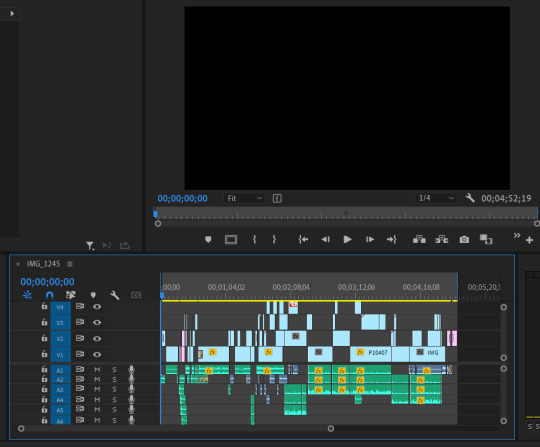
0 notes
Text
Going through my list of Anakin songs one-by-one to pick which ones to put on the final playlist and realizing I don’t have any songs that really fit him in Rogue One, A New Hope or Empire Strikes Back
#i have songs that fit him for each prequel movie and rotj and tcw and rebels#and for the time period between rots and rebels#idk i added welcome to the family by avenged sevenfold as an anakin and palpatine song#but Maybe you could apply it to vader trying to get luke to join him? but idk if that works as well#idk if you got any ideas chime in i guess lol#ftr i'm splitting this into multiple sections for each of his appearances#and each section starts with a track that's relevant to his character#so like the tpm section starts with his tpm theme then the aotc section starts with across the stars etc etc#and hopefully this should make it easier to tell what point in his life ur at#ya feel#also rogue one and a new hope actually share a section cause they're back-to-back#and his role in rogue one is too minimal to give it its own section#shut up tristan
3 notes
·
View notes
Text
How to Start Worldbuilding?

Every year, we’re lucky to have great sponsors for our nonprofit events. World Anvil, a 2021 NaNoWriMo sponsor, helps you develop and organize your characters, plot, and world setting. Today, World Anvil is here to share some pro tips for worldbuilding basics!
How do I start worldbuilding? It’s one of the most commonly asked questions in our community, and one which even seasoned professionals ask! After all, creating epic settings like those of The Expanse, Game of Thrones, or Mistborn can seem like an overwhelming task—but they all start from the same place: the fragment of an idea, carefully grown into something extraordinary. The good news is that you can easily create your own rich, unique setting, and in this post I’ll tell you how to start!
Getting inspiration!
Let’s start at the beginning—that flash of inspiration. Brandon Sanderson describes a drive in foggy weather as his inspiration for Mistborn. Sometimes a setting idea can come from a dream, flash fiction, a TV show or game, a character, or from a magic system you’ve been toying with. The desire to dig into a new genre—sci fi, steampunk or epic fantasy—is also a great place to start. And occasionally, a plot walks into your brain with a setting—or a least a few fragments of one—attached.
Keeping a writing notebook is a great way to hold onto inspiration until you’re ready to take the next step. And reading back over your old thoughts is sometimes enough to inspire you for a brand new setting! But once you have your inspiration—what on earth are you supposed to do with it?
Worldbuilding Meta
Ideas are all well and good, but writing is 1% inspiration and 99% perspiration. So how do you develop the taste of an idea into an entire setting for a novel or series? Well, bring on the Worldbuilding Meta!
A Worldbuilding Meta document is the big stuff, the most critical DNA of your setting. It helps you keep track of the overarching themes and components as you build your world, and to make logical choices. If you already have a setting, it helps you prioritize and streamline which elements are most important, and to avoid bloat or over-complexity. Later in the writing process, it inspires new ideas and even helps you pitch your setting to others! And if you’re writing with others, it’s critical to keep you on the same page.
The Worldbuilding Meta is divided into short sections of questions to help you flesh out your world logically. Each section helps you establish critical information, and those answers will inform the next ones. This creates a dynamic and cohesive world setting.
Scope: Deciding why you’re building your setting is often the foundation for all your other choices!
What is your motivation for building this world?
What is the hook or unique selling point of your setting? What makes it different?
Theme: Genres, mood and tone, as well as the recurring themes and motifs you use to reinforce them, are excellent ways to start defining your setting.
What's the genre of your world?
What is your world’s mood? How does the world feel (character/reader experience)?
What are the recurring themes which reinforce the genre, mood and feel of your world?
Focus: You can’t build EVERYTHING in your setting, or you’ll never write that novel! Focus helps you pick which areas you want to build in more detail (we suggest about five). You might allude to a few others without expanding on them, and some issues won’t be relevant to your story at all. Here are some examples (there are even more on the meta page in World Anvil!)
Military Influence
Religious Influence
Technology Influence
Arts and Culture Influence
Wealth Distribution
Agriculture And Trade
Race Relations
Class Relations
Gender Relations
Drama sets your world in motion, creating a dynamic setting through current affairs. A couple might directly relate to your plot, but others are there to make your world feel expansive and dynamic, and to reinforce your genre and tone. Examples might include:
A blight which has been decimating crops, creating food shortages
A nearby country is on the brink of civil war
Rumors of a breakthrough in transportation technology are circling
A mysterious, new religion has been sweeping through the upper echelons of society
Scene gets specific, nailing down the physical properties of your world (especially if different from our own Earth). Magic, flying islands, ice worlds, extra-long winters etc. can all be mentioned here.
What are the fundamental differences in the natural laws of your world compared to Earth?
What does the geography of your world look like? Does it have special properties or features?
What is the initial scale of your active storytelling space? A city, a continent, or a galaxy, for example?
The People section helps you describe the inhabitants in broad strokes, and also sows more seeds of conflict in your world. Discovering their needs gives them a dynamic relationship and you some great threads for your plot and story!
Who used to live here, and what’s their history?
Which species/cultures live here now and what’s their history?
What do they need, and what do they need from each other?
Two really important things to remember about creating your worldbuilding meta are:
Only write single sentences or paragraphs! This is just the overview, and the longer you make it, the harder it will be to parse through later. Every idea can be expanded as much (or as little) as you want in worldbuilding templates later, interconnected and completely searchable.
You don’t need to fill it in order (although I do recommend starting with Scope - it’s incredibly useful for helping you make other decisions!)
Getting Started
The full worldbuilding meta document with all the prompts is available (for free, of course!) on World Anvil as part of your world setting. You can also find additional prompts and explanations for each question, to help inspire you and guide you in the right direction!
If you’re looking for a good series bible to help you develop your worldbuilding, and keep your setting safe and organized, World Anvil was tailor made by professional writers exactly for this task, and the integrated novel writing software and its marketing capabilities make it an ideal choice for any writer!
Ready to start worldbuilding? Go make a free account on World Anvil to get started right now!
Otherwise, check out the three most common worldbuilding mistakes and how to incorporate worldbuilding into your novel writing method.
783 notes
·
View notes
Text
Comparing the original Best Partner character song series and the new one, and what that says about the 02 cast
youtube
So if you haven’t heard yet, a new series of 02 (it’s actually Kizuna) character songs dropped! Allegedly intended as a slightly delayed 20th anniversary project, the series is a callback to the original “Best Partner” character song album series that released during 02′s actual airing.
If you know anything about the original Best Partner series, it’s one that sets an insanely high bar, even for Digimon standards (and that’s saying something, given the deep associations this franchise has with music). The series of character songs before it, Adventure’s “Character Song + Mini Drama” series, has a…kind of questionable amount of relevance to each character; it’s not like they’re super amazingly out of character, but they don’t really tell you a lot about each character beyond some gloss details (this is probably best demonstrated in how Mimi’s song is blatantly just an AiM single disguised as a Mimi song). Best Partner, on the other hand, very intimately goes into each character’s head and their relationships with their respective partners, even putting in direct words what wasn’t stated explicitly in the series.
So does the new series live up to the high bar its predecessor sets? Answer: on top of some abnormal attention to detail on the covers, it is very obvious that the new series not only has a lot of the depth of the 02 characters in mind, but also is made in direct response to the original series itself. Moreover, putting the original Best Partner series and this one side by side reveals a lot about each of the 02 characters and what they got out of 02′s story, in a surprisingly neat summary.
Let’s go into how!
Since this is something that has a deep relationship with all of these characters in regards to the series, this particular meta would not have been possible without input from multiple people who know these characters better than I could ever hope to by myself. Thank you for all of your help.
A bit of historical context
The original Best Partner series consisted of a set of albums, one representing each pair of partners in 02. Notably, even though nowadays there’s a specific order of the Adventure/02 characters that’s used in modern media, not only does the original series not follow that ordering (as it hadn’t been set in stone at the time), it also leads with the original Adventure characters and not the 02 ones, which is pretty unusual for a series that’s ostensibly supposed to be for 02 (modern lineups will usually favor leading with whichever group the relevant product is branded with).
A lot of this probably makes more sense when you realize that the original Best Partner series was released during the first half of 02’s airing. The final album was released on August 23, 2000, four days before the fateful 02 episode 21 (yes, that means the third track on Ken and Wormmon’s album is actually a spoiler). So in other words, while the original Best Partner series accurately reflects the older Adventure group’s character development and what problems they were able to sufficiently overcome, the 02 group does not have anything about their character development from 02′s second half reflected in it at all.
That’s actually a really huge disparity, when you think about it, especially because a lot happened with the 02 group in that second half – that second half was where the emotional payoff and the results of everything that had been building up over that first half came together. So in comparison to the Adventure group, composed of people confidently talking about what they’ve decided for themselves from now on, you still have the 02 group drenched pretty deeply in insecurity. Watch 02 to the end and listen to those songs again, and you might even think “wait, this is supposed to represent these characters?” So, in essence, the new Best Partner series serves to address that gap, and what the 02 group gained and learned out of 02′s second half.
Best Partner (and its successor series for Tamers, Best Tamers) follows a uniform format: a solo song for the human partner, a solo song for the Digimon partner, and a duet between the two. (Given that, the original Best Partner series was really huge, at a whole 36 songs.) Recalling that, in the Adventure universe, a Digimon partner reflects the human’s inner self and psyche, it’s pretty extensive coverage: what the human has to say about themself, what place their Digimon partner is in relative to that, and what the nature of their relationship is due to that.
Let’s go into each pair of partners in detail!
Daisuke and V-mon
For those who love 02 and love Daisuke in particular, when you ask “what kind of character is Daisuke like?” or “what’s Daisuke’s best quality?”, you’re probably going to get answers like “forward-thinking” or “positive” or “good at uplifting others” – basically everything to do with how Daisuke is an encouraging presence who doesn’t give in easily and has a strong mentality of moving forward in the face of despair. Someone who appreciates and understands others’ best qualities, and loves them for everything they are. So when you look at his original Best Partner solo song, Goggle Boy…
But more than just saving the world
I really don’t want to lose, you know
…Uh…
These goggles are my proof
Given by a certain someone to me
The precious thing he handed over
It’s just like his Crest, you know
Aren’t they cool?
…Well, that’s nowhere to be found.
This is the kind of song that might make you think “wait, this is supposed to be Daisuke’s representative song?!” (It’s possibly because of this that Daisuke’s song from The Bridge to Dreams, Tomorrow, generally tended to be far more favored among Daisuke fans, although it’s more relevant to 02 as a whole than it is to Daisuke in particular.) if you listen to Goggle Boy knowing about what Daisuke’s best qualities should be, this is almost a little frustrating, because this is the kind of thing he really shouldn’t be pigeonholed as – basically, begging for others’ approval and praise and focusing on idolizing others. Even his most insightful moments in this song come from his appreciation of something that came from someone else (Taichi), not from himself.
Well, the thing is, that was Daisuke’s character for most of the first half of 02. Of course, even in early episodes, there were many times where Daisuke’s potential for positivity and forward-thinkingness were starting to poke through, but most of the time he was rolling over trying to please others and chasing after his seniors. The real period of time he started to grow into his own about this was 02 episode 24 and its aftermath – when his time spent with his friends started to fill the void in his life and his need for validation, and the escalating situation, especially with Ken, led him to have a proper grasp of what was properly important and what needed to be done.
So when we get to his new solo, RUNNING MAN…
I’ll keep on running far ahead
Let’s bring everyone along with me, today, too
Really, always, thank you, Thank you so much
Riding the wind, going past the sky
Grasping your hands and flying
I’m even starting to see beyond my dreams
Even in only one section, you can get an instant image of the Motomiya Daisuke we all know and love – someone who appreciates his friends’ role in his life, loves their company, and moves positively towards the future. Because, again, after the events of 02, and after being able to bond further with his friends and gaining his own strengths in leading everyone forward, he became able to more properly express his love for everything instead of constantly vying for others’ attention. Even the title reflects the change, from a “boy” who’s flashing the symbol of courage he got from someone else, to a “man” who’s positively running forward on his own merits.
(Interestingly, RUNNING MAN is composed by Ohta Michihiko, a legendary composer who’s made many of some of the most important songs in the franchise, and also composed many of the original Best Partner songs, including Goggle Boy. It’s interesting how RUNNING MAN is the one most like the original songs in atmosphere as a result – possibly representing how Daisuke is a simple-minded person who ostensibly doesn’t change drastically in disposition – yet has lyrical content that’s so starkly different.)
As a result, this is subtly reflected in the other two songs in each album as well – remember that V-mon is one of the partners who most “matches” his own partner in terms of disposition and mentality. So as Daisuke shifted his own priorities, V-mon did too; we go from Go Ahead! being about taking a stand and fighting, whereas Beyond the Future is about a similar forward-thinking mentality to Daisuke’s.
Likewise, the duets have different priorities as well; 2-TOP was composed of Daisuke and V-mon bickering for the most of it, and the most substantial point you could get about it was that despite their bickering, they made it work, whereas HEY-rasshai! has them almost entirely in sync (with one minor moment of deviance). It’s also interesting to see the topics covered in each; 2-TOP is about soccer, which ultimately is revealed to be a fairly incidental hobby for Daisuke, whereas HEY-rasshai! is about ramen making, which, while comical, also has a very strong tie to “Daisuke’s dream for the future, and his willingness to single-mindedly dedicate himself to something when it’s something he truly wants”. In other words, while Daisuke knew what he wanted since elementary school, it says a lot that he’s at a point where he and V-mon are now taking proactive steps to have that dream achieved, now that they’re able.
Ken and Wormmon
Like with his position in 02 itself, Ken’s is probably the easiest to see the contrast without trying too hard, but there’s still quite a lot to unpack!
When you think about it, in the modern era, it’s actually surprisingly hard to find stuff too relevant to Ken’s time as the Kaiser. The reason is, simply, that the series itself discourages this – Ken himself had an obvious aversion to dwelling too much on it, and the entire series itself has a strong theme of “moving on”. It’s not to say that the Kaiser doesn’t have a fanbase (I’m sorry if you’re reading this and find that I might be implying too hard that you don’t exist), but rather that there’s a franchise and fanart tendency to focus more on “Ken-chan” than “the Kaiser” these days, and old merch from the first half of the series will all too often get responses of “it’s really sad Ken-chan can’t be there…” Of course, 02 itself was also about accepting one’s mistakes, not pretending they never happened, so it’d be foolhardy to deny Ken’s dark history entirely, but it’s retroactively interesting to see such a prominent and persistent piece of merch like Ken and Wormmon’s original Best Partner album focus so largely on Ken’s time as the Kaiser when most of the franchise ended up trying to move on.
Starting with Ken’s solo songs, and his first one, ONLY ONE:
I’ve lived without showing my true feelings, wearing this mask
Well, this was easy to tell from the series itself, but the point driven home is that Ken didn’t want to expose his true self to others, putting on a front of “strength” and smashing his true feelings into the corner so that he could become more of the “perfect” person he thought he was supposed to be. There’s also another interesting line that one should pay attention to:
I polished the knife in my heart
and put my belief in infinite power
Basically, putting up a defensive front to prevent anything from approaching his weaknesses.
Anyway, moving onto his new song, Never Ending:
If I want to be proud of tomorrow’s version of myself
I wonder, what can I do? Never Give-up
I’ll keep fighting, even doing someone else’s part
No, I won’t be afraid anymore
First of all, the main theme of the song is about putting conscious thought into understanding how to stay true to himself – basically, understanding what it is he really wants to do and become, instead of putting on fronts and hiding it from others. Not only that, we see traces of what exactly he gained over the course of the second half of 02 – because so much of it involved constantly trying to blame himself for everything, this song is about what he came to learn in terms of proactively making it up and actively fighting forward. He’s working hard!
We also have this part:
The knife that’s pointed at someone, or at myself
If it’s been let go of
Two things going on here: firstly, we have an explicit reference to the metaphorical “knife” Ken referred to putting up in ONLY ONE, talking about finally letting it go instead of bothering with this kind of front. He also points out that, in a sense, the knife was pointed at himself too, either in the sense of actually having hurt himself through this entire ideal, or in the sense that he constantly was trying to blame and punish himself for everything. None of that should be necessary anymore. Moreover, Never Ending contains a lot of references to “daily life” and the happiness that comes with the simplicity of just being alive – because that was indeed what Ken gained through his experiences, the ability to treasure living life in itself instead of aspiring to an impossible standard.
Another interesting thing about Never Ending is that it’s technically in a similar rock genre to ONLY ONE instead of being “soft”, like Ken’s personality is often thought to be. This was a surprise to a lot of people who commented on how surprisingly “cool” the song was, but this is actually completely in line with Ken arguably being one of the most openly assertive people in this group even after his reformation. Note that it’s very difficult to call this song purely angsty – it’s definitely positive and forward-thinking, and the chorus itself is partially in major key – but it has the vibe of someone who’s fully aware of everything that’s happened, is putting proper thought into it, and is pushing on despite everything. Remember, the intensity the Kaiser had originally came from somewhere; Ichijouji Ken is the same person, in the end.
In regards to Wormmon’s song, the contrast is also obvious: The Future You Dreamed of, the Future I Dreamed Of. is of course about Wormmon’s tormented feelings during the Kaiser’s abusive relationship with him, whereas can change it! is about its aftermath and how they made up (including copious references to the events of 02 episode 23). Even then, there’s a certain “forward-thinking” attitude that marks this song as being representative of being after 02’s events and not during – see the line “The mistake we made that day/is exactly the reason we’ll never let it happen again”, instead of the self-punishment and shame Stingmon expressed in 02 episode 26).
On top of that, the duet song Forever Adolescence also marks a subtle progression from the point they were at from True Strength – remembering that Best Partner 12 was released at a time when True Strength was actually a bit of a spoiler, while Ken and Wormmon obviously had made up by that point, the key line in it is still “everything truly begins from here”. So what, exactly, happened after that? According to Forever Adolescence, the decision made was to keep moving forward, and, moreover, to stay “the way they are”, especially with the nuance that it means it’s okay to not force oneself into the role of an adult and stay “young at heart”. This is really, really important in light of the events of Kizuna, the 02 group’s unusual role in it and its relevance to 02′s themes (more on this below), and how Spring 2003 referred to the pressure placed on Osamu as him being “forced to grow up too quickly” – in essence, Ken and Wormmon have firmly resolved to actively move away from that kind of pressure.
Miyako and Hawkmon
I’ve pointed out several times on this blog that the actual complex Miyako was going through in 02 was that she hated herself more than anyone else in the group would be willing to criticize her – and if you don’t believe me, it’s put in a pretty heavy-handed manner in her original song, Crash and Bingo!:
Fussing about it won’t get anything done
But my selfishness and problems and panic keep coming out
…and even more viciously in her own and Hawkmon’s duet, Fly High:
I can’t do anything right, besides playing around with computers
or
Everyone would be still be fine if I weren’t there
If you thought it was subtle in the main series, it certainly isn’t here: Miyako considered herself good for absolutely nothing and unable to be accepted by others for being too useless – in these songs, despite Hawkmon’s attempts to uplift her, she criticizes her own messy tendencies and considers herself a burden. Best Partner is a positive series, so it still has the attitude of “we’ll try anyway”, but it’s clear that Miyako really didn’t have the highest opinion of herself at all. Hence, Fly High also shows off the worst of Hawkmon having to deal with the fallout – with Miyako flailing around in panic and considering herself good for nothing, he’s forced to carry her around.
But come Miyako’s new solo, From Spain with Love!, we see a huge contrast all over the place:
I, who have evolved into an adult
make everyone do a double-take at me when I walk by!
Exhibit A: actual confidence in herself and ability to consider herself worth something;
If I can always, always be honest with myself
Even if I don’t put together some program, even if I keep screwing up
Ah, you understand me
Exhibit B: understanding that she’s worth something to others besides her utility abilities, and knowing that she has friends who’ll support her despite her flaws (which is very true);
When things are feeling hard, the first thing you should do is call me, okay?
I’ll take the wings of love and purity, spread them, and get there as fast as I can
Ah, I’ll open up any gate I need to
Exhibit C: indulging in her capacity for helping and supporting others;
Al mal tiempo, buena cara
We laugh exactly when things are hard
Exhibit D: understanding the strength to get through hard times, instead of emotionally crumbling under the pressure.
Yep, that’s exactly what her character arc in 02 was about; 02 episode 31 was a huge turning point for her because, in the depths of her berating herself for her messiness and expecting Hikari to be secretly judging her the whole time, Hikari revealed that she was outright jealous of Miyako being able to speak her mind, and Miyako shortly after ended up showing her true capacity for reaching others who needed her help and supporting them, a role she ended up growing into for the rest of the series. Note that, other than the casual remark of confidence at the beginning, Miyako hasn’t necessarily become arrogant or anything – it’s just that, by focusing her energies into how much she loves everyone and turning her “nosiness” and “sticking herself into others’ business” tendencies into positive energy to help everyone, she gained more confidence in her ability to be loved and accepted by others.
This is reflected as well in her new duet with Hawkmon, where, instead of Hawkmon dragging her around everywhere, their differences and mismatched personalities are outright celebrated, and while Miyako still has awareness of her messy tendencies, she’s no longer letting it emotionally rip her apart and has confidence that Hawkmon can be by her side to help her through it. Perhaps reflecting that, Hawkmon himself goes from the over-the-top, dramatic, high-strung Knight of Love to the more calm and straightforward Gentle Tornado, perhaps because his own partner isn’t constantly bouncing off the walls recklessly nearly as much anymore.
Incidentally, it’s not like all of this is without nuance, either; even if Miyako’s become more of a confident person, she’s not all put-together. Considering that the entire song has her gushing about how she’d be willing to drop anything to go see her friends (which was pushed forward in Kizuna itself, what with her willingly taking the same request she’d refused to do earlier just because her friends were involved, and even inventing D-3 gate exploitation just to go see them), when you get to the end, and her gushing about her fun in Spain suddenly derails into reminiscing about the events of 02 episode 42, the implication is clear: for as much as she wants to be wholeheartedly enjoying this fun trip abroad for what it is, she can’t help but let her thoughts float back to memories and friends she cares about, and her bonus conversation with Hawkmon drives it in further that, ultimately, she dearly misses them too much.
Iori and Armadimon
Iori also went through some drastic changes in character over the course of 02, so when you look at My Conclusion, it’s basically Iori at his “worst” point of black-and-white morality:
Everyone, I will be speaking my conclusion
Evil will not be tolerated
Even evil in itself
will be defeated by justice
That will always be a certainty in the end
I mean, let’s even consider the fact that the song is called “My Conclusion” in the first place. Iori’s slamming this all down like this is the end-all of everything, and you can’t change his mind! He does briefly admit that there are certain things reason itself won’t change, but it’s more like he’s on the verge of having an out, because in the end, really…
Everyone, I will be speaking my conclusion
Our enemies are beyond reason
Again and again, to the very end
They will certainly use cowardly means
to come and attack us
Rationality. No feelings involved. Evil is evil, and justice is justice. No takebacks. Life exists by rules, and nothing else.
Message to the Future is possibly one of the most interesting songs in the original Best Partner collection, because it does actually provide hints about where Iori should be going in the future, and also has a lot of things that retroactively hit a lot harder from the meta perspective. The song fully fleshes out Iori’s feelings and concerns about how to grow up into a proper adult (which was hinted to be his real motivation as to why he was so strict with himself in 02), and that, most of all, what he wants is for his “feelings” to never change no matter what happens. Iori expresses concerns about how he might change as an adult to Armadimon, and Armadimon assures him that he’ll still be “Iori”, no matter what.
So, come the new character song collection, Iori’s new solo song is aptly titled “Things That Won’t Change” – because, in the end, despite everything that changed, his feelings did not. He says it himself: the important parts that he really wanted, the desire to do the right thing and to protect others, never changed a bit at all since “back then”. What did change, however, was his way of going about it.
Rather than what someone else has decided
I’ve chosen my own future now
and again:
Rather than imitating someone else
This is to shout out my own future
The emphasis on this being Iori’s own choice is important because Iori has finally decided not to live by strict rules imposed on him nor by imitating others (remember, part of the reason he kept doing what he did back in 02 was because he had such a strong belief “my father would have done this”). Others had been encouraging him to “make his own decisions” from the get-go – even Hida Chikara himself had told him that he was the one who needed to decide what to do in any moment in 02 episode 5 – and after dealing with a violation of his own morals in having to kill a Digimon in 02 episode 44, one episode later, in discussing with Takeru, Iori has to come to terms with the decision to continue fighting because “this is what I have decided myself”, because it’s not about whether he has an obligation to keep fighting for the sake of justice, but because he, himself, wants to protect others, and will do what it takes to do so. There’s no more of these strict rules of “because it must be this way” or the black-and-white morality that caused him to be so initially hostile towards Ken and Oikawa, but an understanding that these things need to be decided from the heart.
Moreover, unlike My Conclusion, Things That Won’t Change isn’t written like Iori’s turning in some school essay, but rather, more than half the song is in casual-form Japanese (which was associated with Iori when he became more emotional and wasn’t keeping himself in check anymore), and is more of a thoughtful reflection of his own feelings rather than trying to pass itself off as following rules because he must.
Thus, while the duet Choo Choo Tryin’ isn’t as heavy-handed as Message to the Future, Iori and Armadimon acknowledge that they need to be forward-thinking and keep going (generally tied to the message of 02 in itself), and Iori outright discusses the potential pitfalls of becoming too stiff. Furthermore, the song has copious rap portions, which seems rather unfitting for Iori on its face – until you realize that not only was Iori sometimes willing to indulge in more fun even back during 02 (just because he was strict with himself didn’t mean he was a complete killjoy), Iori’s also just a lot more flexible-minded in general, and has a penchant for wanting to do things right when he’s given a task. (His delivery of the rap in the song isn’t monotonous nor overly emotional, but has the nuance of someone who’s trying to recite all of it with caution.)
The part that’s particularly striking from the meta perspective is that Iori and Armadimon are no longer voiced by the same voice actress; Message to the Future was essentially Urawa Megumi talking to herself. So now, Iori has a new voice actor, and in many ways has become very different from Armadimon – but because Armadimon sounds a little like Iori, you could say he’s helping preserve the childish side of Iori that’s more important than ever to hold onto, especially since Iori himself worried about changing too much. And so, Iori’s still willing to indulge in a sort of “fun” song like this, and in the end, despite everything, you understand that they haven’t drifted apart at all in the slightest.
That’s not to say that Armadimon himself hasn’t changed either – in fact, he’s changed himself in response to how much Iori has. His original solo song had a lot of easygoingness to it, and some constant reminders for Iori to please, please chill – but his new one has a much stronger sense of resolve and forward-thinking attitude, reflecting that, while Iori himself technically had to learn to embrace more emotional uncertainty through the events of 02, it was also able to give him much stronger resolve that this was something he was doing because he was emotionally prepared for it, not out of some sense of moral obligation.
Takeru and Patamon
I’ve already covered Takeru’s original Best Partner song Focus and how it’s probably not about shipping as much as the fanbase tends to pin it as, but in any case, the operative part is here:
Before I knew it, I was watching over you
Still standing at a skewed angle from behind
The focus of your heart
I wonder, is it on me, or…
No, I can’t ask
Takeru couldn’t bring himself to ask sensitive questions or be straightforward about his emotions – which is basically what was Takeru’s lingering problem over Adventure and 02, that he kept swerving around or even lying about sensitive topics and holding everything inside, until one of his triggers was hit and everything exploded. Therefore, even when an important question about someone else comes up, he “can’t ask”. Moreover, for all Takeru is known as a lighthearted and kind person, Focus is a really turbulent song with a really harsh arrangement, and it’s a pretty accurate view of all the complicated and sometimes even negative emotions that Takeru was (badly) coping with over the course of 02.
This was the whole issue with Takeru and Iori’s Jogress arc in 02 episodes 34-36 – that Iori felt he couldn’t understand nor communicate well with Takeru, and had to eventually take matters into his own hands in order to properly understand his feelings. Takeru’s further interactions with Iori were significantly more straightforward for the rest of the series, and the experience also led to Takeru being able to more openly communicate with Ken as well, since the two had been on awkward speaking terms for most of the third quarter of the series.
So when we get to Step High Step…
You lament, you don’t have confidence in yourself
I’m saying this to you as I’ve been watching you
You’re amazing at all times
The song features Takeru being fairly straightforward about his feelings and opinions instead of just dodging it and going for an “everything’s okay” keeping-the-peace attitude, and not only that, he’s commenting on someone else, something that he probably would have refrained from in 02 for being intrusive. Of course, Takeru was always a nice person, but he wasn’t exactly straightforward about being nice back then – and yet here we are.
Since Focus is probably about his relationship with Patamon and how he kind of wasn’t exactly straightforward about his worries with him either (see 02 episode 34), it’s also interesting to compare Takeru and Patamon’s duet songs as well. Steppin’ out does portray a progression from Adventure in that they’ve accepted they can “do things over” again after things crash down (presumably referring to Angemon’s death and rebirth), but you’ll notice there isn’t much in the way of actual communciation between the two – something that’s not only present in Le Lien, but also portrays them as outright in-sync to the point of “telepathy”. We’re talking about a pair where the fanbase has historically had doubts about how similar they were back in 02 because of how “mismatched” they seemed!
Which, incidentally, they weren’t actually – you can see Patamon pretending he’s not about to cry in his original Best Partner song Don’t Stop Pata-Pata, much like how Takeru would cover up his own emotions, and gritting his teeth and resolving to fight harder. Meanwhile, while Ring of Smiles ostensibly continues to have Patamon be “sweet and cute”, it contains a lot of important nuances of “appreciating daily life with friends”, even if Patamon himself can’t quite find words for it – in other words, it’s actually some rather insightful and thoughtful sentiments from Patamon about the importance of being with and connecting with others, mirroring what Takeru himself learned in connecting with the others around him, especially Iori.
Hikari and Tailmon
Remember, Hikari has two lines (one in Adventure and one in 02) that basically summarize the main “issue” she was dealing with in both series: she was selfless to unhealthy levels, and would prioritize others’ welfare over herself to the point of self-destruction. So in her original solo Best Partner song, Gentle Rain, she puts it pretty explicitly:
I want to always be wearing nothing but smiles
But I can’t be cheerful all of the time
or:
So that I can become a greater version of myself
Please give me strength
All things considered, Gentle Rain is full of Hikari’s own insecurities, and her belief that she doesn’t have enough strength to do anything for herself. She makes references to being pulled to the Dark Ocean, mainly because – as she says – she doesn’t want to go there, but she doesn’t have enough strength or willpower to resist it. In fact, Best Partner 11 is full of a lot of angst; Gentle Rain is Hikari angsting about her own weakness and inability to do much for herself, Getting up is Tailmon angsting about her painful past and everything to do with it, and Shining Star is basically a plea for both of them to be able to do anything despite all the pain. It’s all pretty severely heavy content, despite the initial sparkly-looking sentiment of it all.
Considering the circumstances, it’s not really all that surprising. Hikari spent her time in Adventure and the first half of 02 very “emotionally isolated” from the others, to the point very few people could understand what she was thinking, and while she’d never hesitate to put herself out for other people, anything to do with herself, like getting pulled to the Dark Ocean, would result in resignation “it’s over” and “I can’t do anything about it”. Tailmon came from the background of being effectively raised by the abusive Vamdemon, so 02 was really only part of the earliest portion of her moving on with her life and being able to spend happier moments with Hikari. But, of course, the real turning point was 02 episode 31, when Miyako finally managed to break through to her and convince her to not accept the inevitability of things happening to herself, to accept help with the support of others, and to not take things happening to her as a sign she’s doomed.
So when we reach Hikari’s new solo song, Tomorrow’s Blue…
I want to chase after my dreams and hopes, it’s fine even if they’re incomplete
I won’t lose, I won’t stop, I’ll do this to stay true to myself
The most striking thing about the song is that it features Hikari assertively talking about her own desires and feelings, when back in 02 she basically tried to kick them out of the picture for the sake of everyone else (and, really, even in Tailmon’s new solo song, Tender tale, she outright calls Hikari out for still prioritizing other people over herself). It’s not demeaning herself, it’s not resigning herself to anything, it may have a slight admission that she’s not super-confident about everything yet, but it’s still her looking forward and choosing to pursue what he wants. It’s a big deal!
And instead of the constant angst that permeated Best Partner 11, the new album is about Hikari and Tailmon talking about their feelings towards each other – something that neither of them really verbalized that well over either Adventure and 02 – and contextualizing their importance to each other over the course of their “story”. Hikari talks about Tailmon’s role of assertiveness in helping her break out of her shell, and Tailmon generally provides an extremely accurate description of Hikari in a nutshell – that she’s a bit mysterious, that she’s emotionally sensitive, that she’s cheerful and lifts others’ spirits. What’s more, Tailmon makes a reference to the same kind of “pain” and “losing things” she referred to in Getting up, but instead of angsting about it, she positively accepts it as something that may happen in the process of protecting others. (Oh, and it and the new duet A Tale of the Light also make reference to Hikari’s photography hobby in 02, contextualizing it as something Hikari did to chronicle their precious memories.)
So in summary, Hikari and Tailmon have both been able to accept 02′s philosophy of becoming forward-thinking, positive, and accepting the help of others in order to move forward. Not bad!
Conclusion and digression
Despite how these songs are almost polar opposite in portraying their before-and-after development of the 02 kids, nobody’s really argued that any of them are out of character! In the end, it’s a pretty succinct depiction of what these kids were dealing with and what they grew into by the end of the series. Seriously, I never, ever want to hear that these kids were underdeveloped nor that they didn’t go through any significant development over the course of 02 ever again. That’s just not true at all, and this simply happens to be one of the many illustrations of how.
Moreover, the songs themselves and the “conversations” that came with the new albums solidify firmly that the 02 group has extremely tight relations with their partners even at this time – with Daisuke actively consulting V-mon for help, Miyako, Takeru, and Hikari actively dragging their partners everywhere with them, Ken having Wormmon be his effective alarm clock, and Iori being so close with Armadimon that his Nagoya dialect is rubbing off on him. Daisuke, Miyako and Hikari have a huge point made that, regardless of the rather easygoing way they’re going at it, they’re very aware of what they want to do from this point out and are following it with gusto (and while it’s not stated in words, Iori carrying a huge textbook, presumably a law one, with note markers all over it drives the point home that this applies to him, too). It’s a really, really huge contrast to what was going on with the directionless Taichi, Yamato, and Sora effectively neglecting their own partners back in Kizuna – and further reinforces the reason the 02 group was in such an unusually favorable position during the movie.
61 notes
·
View notes
Text
Parascientific Escape: The sci-fi “escape room” visual novel-style series nobody talks about
I can’t help thinking that Parascientific Escape would probably have an active fandom somewhere on the Internet if it wasn’t TRAPPED ON THE 3DS ESHOP.
I mean, it’s an escape room-centric visual novel-style sci-fi Japanese game that is clearly inspired by Zero Escape and very anime in its style. There are endearing characters, including optimal waifus/husbandos, plus a gradual buildup of an interesting fictional world full of political intrigue, its own countries, its own companies, and of course... psychic powers. Because you can’t have a trilogy of Japanese visual novel-style games featuring escape room puzzles without mental powers, now can you?
But as I said... they’re trapped as download-only titles for the 3DS. That’s fucking brutal.
Even so, there’s a pretty big 3DS/2DS user base still in existence. It’s not like they’ve never been translated or something, so at least we have the capability to play them. So if you look into them, what are you getting?
A basic overview: Parascientific Escape is a trilogy of anime-style games about solving escape room mysteries and tracking down evildoers via the use of psychic powers (obvious Zero Escape influences). There’s an overarching plot about a mysterious mastermind who believes it’s time for the recently emerged psychics of the world to take their place as the next evolution of humanity and get their own nation (obvious X-Men influences).
They don’t work very well as standalone stories; each story relies on information from the last one, culminating in a game that stars the protagonists of both parts 1 and 2 together as they finally unravel the motivations behind the events of the whole series and face off with the people behind everything. In addition, the escape room puzzles start out pretty easy in the first game build to be pretty frustratingly obtuse by the tail end of the third. And on top of all that, each game taken on its own only contains about 3-4 escape rooms. So when you bundle all three together, that’s when it all works as a single satisfying package.
Don’t worry about burning a lot of cash to play the whole series, however. The three games are $5.00 US each on the 3DS eShop and are usually on sale for $2.50 each these days. I got the entire trilogy for $7.50 US!
So let’s break down the gameplay and setup in a little more detail. Don’t worry; I won’t give any spoilers that go beyond the first five minutes of any game in the series. The twists and turns are part of the fun here.
The first game is Parascientific Escape: Cruise in the Distant Seas. You play as Hitomi Akeneno, a high school girl (because of course she’s a high-schooler) with the dual abilities of mild telekinesis and a type of clairvoyance that lets her peer past barriers or into the insides of objects. She finds herself trapped on a sinking cruise ship where some mastermind keeps systematically locking her into isolated sections while she’s trying desperately to escape.
I really liked how you could look inside of an object with clairvoyance and then use her telekinesis to manipulate the various switches and levers within, gradually pulling some object you need out from within a maze. I also thought it was clever how the solution to a new escape roomight require you to backtrack to a previous escape room to investigate some object or area that wasn’t relevant to that previous room’s original puzzle.

(One of the things I found most fascinating about this one is the ethical debate raised by Hitomi’s friend Chisono regarding how Hitomi got herself involved in all this. Chisono offers a perspective that is extremely unusual to see in most fiction. You can even say it’s pretty cold, but it’s not without having some merit to it. I don’t want to say too much about what I’m talking about, though; it’s better left as a surprise.)
The second title, Parascientific Escape: Gear Detective, almost seems standalone at first. You play as Kyosuke Ayana, a private detective and actual adult (!) who is 22 years old. A young woman shows up at his office and asks to hire him for protection. See, there’s a serial killer on the loose, and she believes she’s the next target.
We are swiftly told that Kyosuke was once in an accident that necessitated the replacement of his left arm and right eye. He volunteered to be a guinea pig for some very special prosthetics that granted him artificial psychic powers. As such, he now has “chronokinesis” — to the power to look back in time. However, he can only look back for five days, and he only has limited ability to move or manipulate the things he sees in the past.
Naturally, Kyosuke’s investigation winds up trapping him within some escape rooms that require use of his unique abilities to solve. Some of the hints at the proper timestamps or exactly where you should be looking when you peer into the past are a little vague, though, which can cause momentary frustration. Because I like to always be making forward progress, I actually preferred Hitomi’s telekinesis/clairvoyance powers from the first game. Still, Hitomi had some pretty basic puzzles in her rooms. I can’t deny that these puzzles took more thought.
Outside of the escape rooms, everything is undeniably a huge improvement. The first game presented strictly linear segments of storytelling between the rooms, but this one is more of an adventure game. You can choose where you go, select from a limited menu of things to do when you get there, and do all of it in any order you like. There’s usually a correct sequence order to progressing the story, but it’s typically pretty clear what the next step is, so it’s not like you’re just flailing about and trying a bunch of locations blindly. Besides, there’s no way to get stuck, so don’t stress it. There are even a lot of actions you can take that have no impact on story progression at all — they’re just there to generate additional dialogue that further develops the characters.

The tradeoff is that you actually get fewer escape rooms overall. The first game had four, but the second only contains three. This is also the first game in the series to introduce multiple endings; you get a number of dialogue choices throughout, and unfortunately, it’s far too easy to trigger the “bad” ending. There are guides online to help you trigger the Gold Star “true” ending, however. Just hit up GameFAQs. You might want to use the guide on your first playthrough, because I can say from experience that it’s annoying to have to replay all the dialogue sections just to make the correct choices. (Luckily, you can skip over any irrelevant sections of each chapter — including the escape room puzzles.)
In spite of my above whining, the second one is probably my single favorite story in the Parascientific trilogy. It’s a lot of fun.
The final game in the trilogy is Parascientific Escape: Crossing at the Farthest Horizon. Mysterious characters who were plotting offscreen for the previous two games are finally given faces, locations that were talked about extensively in both are finally visited, and the two protagonists of the first couple games finally meet and team up. It’s absolutely a culmination of what they set up in the first two.
The narrative jumps around from the perspectives of many different characters, but the most time is undoubtedly spent with Hitomi and Kyosuke. Sadly, there is no gameplay usage of Hitomi’s powers this time; the escape rooms are all done with Kyosuke, and they are more devious now than ever before. Personally, I found the next-to-last one to be incredibly obtuse and frustrating. I ultimately had to consult a video playthrough on YouTube for that. (The YouTuber in question didn’t seem to have the same issues figuring things out that I did. So I guess your mileage may vary.)

The “adventure game” segments make a return here as well, although they’ve also become a bit tougher to figure out. There are a couple of times when you might find yourself wandering the various location options, clicking on every possible action to try and progress. Luckily, there aren’t so many default options that you’re left flailing for very long. Even the longest period of clueless wandering lasted me a maximum of 15 minutes.
Once again, you have to make the correct dialogue choices if you want a positive ending. And once again, GameFAQs is your friend and co-pilot.
Ultimately, even the gated endings and occasional puzzle frustrations did little to curb my enthusiasm. I really had fun with these characters and their stories, I greatly enjoyed the majority of the escape rooms, and I was pretty satisfied with how it all wrapped up. The character designs/artwork get better and better as the series goes on. The selection of music tracks may be the same throughout the whole series, but I really dug on them, so I can’t complain. Do I have any other misgivings? Well, just one; the English localization is pretty sloppy. There are a pretty large number of typos, and the dialogue can sound stilted and awkward at times due to being a direct translation. It’s actually at its worst at the start of the first game. Luckily, after about 30 minutes of playtime, it settles in and finds its voice.
Seriously, they should really figure out a way to re-package these games for another system that doesn’t use the the dual-screen setup. Put all three of them together, and it’d easily be satisfying as a full retail release!
But for now, if you have a 3DS/2DS, they’re only $7.50 in total most of the time (and $15.00 at the worst). Do you like adventure game-style mysteries and visual novel-esque progression and, of course, escape rooms? You should give these a shot! And I hope these devs get to make games with bigger budgets and better localizations in the future.
#parascientific escape#parascientific escape: gear detective#parascientific escape: cruise in the distant seas#parascientific escape: crossing at the farthest horizon#3ds#2ds#3ds games#2ds games#video games#visual novels#Kyosuke Ayana#hitomi akeneno#escape room games
25 notes
·
View notes
Text
picking it apart - spencer reid
spencer reid x reader
warnings: fluffy fluff and like one? curse word 😌 also final destination spoilers if you haven’t seen it? do i need a spoiler alert for something that came out 20 years ago?? idk
word count: 859
notes: this is a little segment i like to call flora watches 3 seasons of a show and thinks she’s qualified to write something true to the character but she’s gonna write it anyways
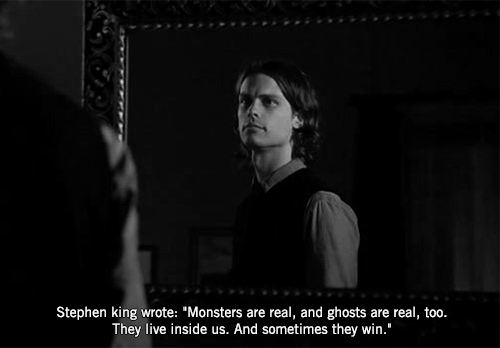
********************
tonight was one of the rare nights spencer hadn’t been overworked into a nearly unconscious state, so you decided to make the most of it.
“wanna watch a movie?” you slid into his lap with a grin. you gave him a kiss, relishing in the deepness of it, but subtly using it as a tactic to get him to say yes to you.
he almost immediately gave in (of course) and got up to pop some popcorn. you were scrolling through the horror section on netflix, jumping when you heard his voice behind you. “you know, all these films have extremely vague titles that invoke the feeling that something’s wrong, therefore convincing the viewer to click on it to find out the relevance of the name.”
“thank you for the lesson in marketing, doctor,” you giggled. “now get your ass over here.” he took a seat and balanced the popcorn on both of your laps as you cuddled into his side. “hmmm, what are we feeling tonight?”
you continued to browse through your choices, finally deciding on one. “i think you’ll like this one, spence,” you muttered as you clicked on final destination. “there’s so much to analyse.”
“i’ve analysed enough today, my brain is tired,” spencer whined, dropping his head onto your shoulder.
you pouted at his statement. “aww, poor baby. this one should be perfect for you then, it’s pretty mindless.” you hit the play button, eager to get the movie started.
the two of you laughed at some of the cliche teenager moments, but you could’ve predicted that when it came to the inciting incident, spencer would most assuredly have something to say.
“did you know 49% of all plane crashes are caused by pilot error? and that crashes are 95% survivable?” you turned to look at him, the orange from the flames on screen illuminating his features.
“no i did not,” you grinned. “but you’re gonna have to suspend disbelief if you want to enjoy these kinds of movies.”
the survivors of the plane crash lamented their loss as some new faces entered the room, two of them introducing themselves as fbi agents. “look, it’s you!” you nudged him playfully.
“wow, they definitely picked the coolest names to represent such a high profile government organization.” he murmured sarcastically.
“you’re right, spencer reid is a much cooler name, why didn’t they use that one?” you teased. he gasped in offense, crossing his arms and letting go of you. “hey, i’m kidding! i think you have the coolest name!”
“alright, alright, you are forgiven, come here,” he sighed, uncurling his arms to wrap them around you once more. as the investigation played, you could practically hear the gears in spencer’s head whirring as he memorized the student’s statements. you were tempted to remind him he didn’t have to look at this like a case, but he seemed pretty invested at this point. oh well, that’s just a profiler’s brain, you thought.
the parents of the survivors rushed into the room to console their children while some of their parents didn’t show up. you looked over to spencer to see a pang of remorse on his features, clearly sympathizing with many victims he’d seen before. “bub, i can skip this part if you want?” you offered.
“no, it’s okay, i don’t want to miss a minute of this enthralling storyline.” he smirked. “it’s interesting, but i think it could’ve been thought out a little more.”
“ooh, i didn’t realize one of your three phds was in cinematography, doctor reid! please, tell us more.” your giggles were quickly tuned out against his lips. with the cheap gore of the movie having become background noise, you indulged in the closeness of each other.
the sudden sound of a train rattling across the tracks emanated from the tv, scaring you both apart with a jump. as you tried to calm your racing heart, spencer looked over to you with a knowing gaze. “wanna call it quits?”
you nodded quickly, switching off the tv as the room became swathed in darkness. you stumbled into the kitchen, bumping your hip against the table as you blindly walked.
“you scared death personified is coming after you?” spencer cooed in an eerie tone. you scoffed and reached for the flashlight on your phone. “oh please, why should i be scared?”
“because horror movies trigger the fight or flight response which can often cause people to have nightmares.” he offered simply. you rolled your eyes, though you doubt he saw in the pitch blackness.
“how did i know you’d have a fact about that?” you mumbled, reaching for your doorknob.
“maybe you’ve somehow avoided death in the past few days and its working its way to get you, now!” spencer shouted suddenly, gripping your shoulders tightly.
“what the fuck, you dork?” you squealed. “do not put those ideas in my head this late at night.” you flopped onto the bed, pulling your boyfriend down with you.
“no more talk, only sleep and cuddle,” you groaned, wrapping your arms around him. all was silent for a few minutes until:
“you never know, though, the statistics o-”
“spence!”
******************************
in case you were curious, here are my sources for any statistics/facts mentioned: planecrashinfo.com, businessinsider.com, bustle.com
also idrk who to tag and i’ve also never written for spencer before soo @sojournmichael @linguinereid
#not me being too self conscious to tag more people couldn't be me#NOT THE WORD COUNT WEBSITE SAYING YOU COULD READ THIS IN 3 MINUTES#this was supposed to be longer but i got anxious so no ❤️#this is also not my best work#god why do i keep apologizing (and rambling)#n e ways#spencer reid#spencer reid x reader#spencer reid imagine#spencer reid oneshot#spencer reid fic#spencer reid fanfic#spencer reid fanfiction#spencer reid fluff#spencer reid criminal minds#criminal minds#mgg#mgg character#my writing
305 notes
·
View notes
Note
Hi! I'm so curious about your writing process! I was wondering, do you have like, drafts of random scenes that will come up later, or do you keep everything entirely in your mind until its time to put it in the game? I personally always write drafts for the scenes i like even before its time for them in the plot but then i get so distracted by these 😅 Anyway, you are incredible and I hope you're having a nice day!
Hiya! 💗
My writing process for Wayfarer is pretty different from how I usually write. I typically prefer writing in chronological order, but on small(er?), contained projects I sometimes jump around depending on what I want to write on a given day. I have a two-act play where I wrote the first act and then the third act and left the second act for last because it was the hardest. 😅
But because Wayfarer is as much a game as it is a web novel, the scope makes it impossible for me to skip around. The number of variations and the way they compound to create unique results and outcomes makes it necessary for me to write in chronological order. I can't start working on scenes from later chapters because I'm not sure where exactly the emotional throughline of the characters is going to land before I've written the material that precedes a specific scene, and I'm also not exactly sure which variables I need to track because I haven't created them yet.
For a project as large as this one, I rely heavily on a rigorous outlining process. I have a master beat chart that gives the rough overview of the major events in each chapter and the most important plot points of each act. I don't go into the nitty-gritty details here, the master chart is specifically for the overall plot of the game.
I have smaller beat charts that go into greater detail for each Act so I can have a clear sense of the pacing (plans for romance/friendship scenes and main character side quests go here). And then when I start working on a chapter, I create a full chapter outline and smaller separate, detailed outlines for each major section and the branches within that section. These are usually done in a way so as I'm writing each branch, I can quickly check off all the things I need to account for as I complete them.
When I'm actually writing new material for the game, I work in sections leading up to a bottleneck (a bottleneck is when all relevant paths/choices lead back to the same scene).
So, for example, right now I'm working on a large endgame sequence in Route B where Aeran and the MC have to return to the Count (returning to the Count is a bottleneck, it's a plot event that will always happen). This sequence is divided into three sections, depending on the player's previous choices. Each of those three sections are further subdivided into branches that split again depending on skill checks before they bottleneck back onto the same path.
The game's mechanics often mean I'm dealing with 4 outcomes per choice. Even though the player only sees 2 choices (like a Strength choice and an Agility choice), the passage actually leads to 4 possible outcomes (i.e. 1 for passing Strength, 1 for failing Strength, 1 for passing Agility and 1 for failing Agility) or more if there are alternative, non-skill based choices.
It becomes a lot to keep track of, so I colour-code everything in my Word document. I also make a list at the start of each major section or branch that covers all of the possible results so I don't miss anything. It basically turns into a game of "Did I do all the orange choices? OK, yes, we can move on now." 😂
Once I've finished all the material for a branch, I'll put an X next to it so I know I've written it and move on to the next branch. I also include notes about any approval changes or variables I need to flag here so I don't forget them when I start coding. I don't like coding directly in Word, it just makes things more difficult to read and keep track of when I start putting new game content into Twine.


I keep an Excel file that tracks all the variables (their names and whether they're a boolean, a string, an array or an integer), what choice they track, what sequence/area they first appeared in, and whether or not they will continue to be used after the end of the chapter. I unset variables when I'm done with them to help keep the game's memory size down (Wayfarer is going to be huge, so any excess stuff in the background needs to be trimmed).
When I'm writing a scene, I try my best to stay in that scene and not worry about anything outside of it. Otherwise, I would get easily overwhelmed by the amount of content I have to create to stay true to the game's vision.
When I have really specific ideas for a scene that occurs much later in the game, I usually jot them down alongside some rough dialogue for later reference (I have a few Mel, Ren and Calla romance scenes that currently exist in this form). I also keep a journal or a stack of paper next to me while I'm writing so I can write down any ideas that may spring up for later incorporation. Writing them down right away and moving on helps me keep my focus where it needs to be.
I also keep a separate sheet for any edits/changes to code/lore changes for existing material I may think of as I write. When I work on a patch for the game, I always tackle the things on that list first before I move on to bug reports.
And that's about it. 😅
#wayfarer#process#answered#long post#sorry for rambling!#i am not good at explaining how i do things
33 notes
·
View notes
Text
Unicorn Chronicles, Book 4: “The Last Hunt,” by Bruce Coville
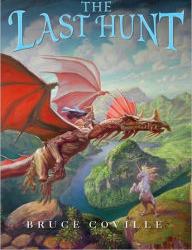
The Last Hunt is even longer than Dark Whispers--the hardcover edition runs to a whopping 605 pages (not including a multi-page character list), so it's a great example of Sequel Creep. Scholastic never gave it a paperback run, so Coville ended up buying back the rights and re-releasing it as smaller volumes (bringing the series to seven in all) to balance it back out a little. But still. It's a lot.
Coville says in the acknowledgements:
If I hadn't been painfully aware so many people were waiting for this story, I might have given up at any number of points along the way.So thanks, dear fans, it's been a long journey, and I literally could not have done it without you.
1) Awwww. 2) #relatable.
The Last Hunt is divided into sections based on time: 'Blood Moon Night," 'Day One of the Invasion,' and so on. The entire book spans about six days in all (five days + the Blood Moon), although there are lots of flashbacks and the last chapter opens with a time skip of several weeks. Suffice to say, this is one hell of a week. Each section is also captioned with a quote--sometimes from one of the Unicorn Chronicles, sometimes from Sun Tzu's The Art of War, which is unexpectedly plot-relevant.
We left off with Beloved and her army of Hunters invading Luster by ripping a hole in the Axis Mundi, the World Tree, with the intent to kill all the unicorns. The unicorns, led by the newly crowned Amalia Flickerfoot, must decide what to do next.
What follows: so many subplots, an inevitable quest, dragons, humans gonna humans, baleful polymorphs, dramatic battles, and a literal deus ex machina.
WHAT HAPPENS:
Lightfoot is right by the Axis Mundi when the gate opens, so he watches in horror as the Hunters come through. He tries to escape to warn the Queen, only to be pursued. To escape, he runs through the Gate to Earth, which for some reason burns people the second time around if they don't wait long enough (for reasons that make zero sense to me). Lightfoot finds himself in Beloved's keep in the Himalayas, and finds Cara's mother Martha asleep and pulls her out of the Rainbow Prison.
Fortunately, Martha was able to make contact with Ian and company long enough to learn how to pull them out, so she does. Lightfoot is afraid to go through the gate because he doesn't want to get crisped, so they wait until Beloved sends her troops after him, and then sneak in behind them. It turns out Fallon created the unicorns and is basically a deity.
Beloved has adopted a bunch of orphans -- girls abandoned by their families--whose purpose is to be unicorn bait. We meet one of them, Feng Quan, who is a total badass and a Sun Tzu stan, who is horrified when she witnesses a unicorn being slaughtered and jumps ship. Feng Quan runs into Belle, who has been haunted by the Whisperer (who knows Belle wants to be Queen) and convinces the skeptical warrior to take her to Amalia Flickerfoot.
Meanwhile the Geomancer M'Gama has been captured by the delvers, and Rocky and his reunited cove search for his teacher, the wizard Namza, who is turned to stone and having a lot of flashbacks. They eventually join up and work to stabilize Luster, which is devastated by increasingly severe earthquakes as Beloved's gate is destroying the Axis Mundi and thus the entire world.
The queen sends Cara on another quest, this time to beg the dragon Grammaug for aid. (IDK while Amalia doesn't try to get all seven dragons, but okay, fine, whatever.) This time, it's only Cara and Medafil, because everyone else is busy. Cara encourages her grandmother to "think like a human" to outwit Beloved, which Feng Quan seconds when she arrives.
Grammaug turns out to be a dragon who turned into a human (it's complicated) and came to Luster because she was basically allergic to the world that all the other dragons went to when Bellemore opened THEIR gate. I thought that her story dragged on a little long, but it does eventually turn out to be relevant, since we are introduced to Transformational Magic, which can be moved around from person to person. Watch this space.
Hunters are looking for Cara, using special "blood trackers" that cannot be fooled, because Beloved wants her for unspecified reasons. Thomas the Tinker is also on his own quest to pick something up at the Queen's behest. The centaurs are having drama of their own as well. Ian tries to track Cara and gets captured by the delvers and taken to the king, who sends him to Beloved.
Grammaug agrees to help, but they are intercepted by the hunters on their journey back and Cara encounters Elihu, the mysterious "friend" Fallon has been searching for, who transforms her into a unicorn in order to lure the hunters off the scent.
Amalia and Feng Quan come up with a plan and send Grammaug to deliver a message, lying to the dragon about the details to mislead Beloved. Grimmwold summons the Queen's Players as part of the plan. Cara runs into Fallon, who reveals that Elihu created Luster, and was banished from the gods' realm because of it, and Fallon came down with him. Grammaug persuades Firethroat to join the battle; Firethroat is very pro eating humans, and agrees. The Whisperer uses Martha Hunter's anger about her mother to try and turn her against the unicorns.
Everyone converges on the Axis Mundi before the battle. We learn that a deity called Allura was responsible for sending the story of the Whisperer from the Chronicles and giving it to the centaurs and she made the Squijum. Like Fallon, she is searching for Elihu. Cara reveals her true identity, and reunites with her mother, who rejects the Whisperer.
Fallon summons the Whisperer and fights it to the death (Fallon's doesn't take). The group pieces together that the Dimblethum is Elihu--he returned to his true form when he betrayed Luster by helping Beloved with the Gate, only to revert back when he used his magic on Cara--and they must bring him back since he's the only one who can save Luster.
The Queen's Players stage a performance and Thomas produces a cockatrice who starts turning Hunters to stone. The dragons shoot flames, and the unicorns attack. Rajiv frees Ian in the chaos. Moonheart dies in the charge. Beloved is perplexed by the Whisperer's absence, and the centaurs and delvers arrive to join the fight. The Hunters flee back to Earth. The Axis Mundi splits in half and the dragons try to hold it together temporarily.
Cara attacks the delver king, who is trying to murder the Dimblethum, and the delver king falls into a conveniently opened hole in the ground and is swallowed up forever. Fallon uses transformational magic to swap places with Elihu so that Elihu can fix the tree. Elihu can't hold it alone, so Allura helps and both are swallowed up by the repaired tree. Graumag dies.
Beloved, believing Cara to be dead, takes Martha hostage and taunts Team Good. Cara reveals herself and Beloved begs for death. Cara tries to heal her and fails and Beloved dies.
Rajiv joins the Queen's Players. Cara is still a unicorn and no one can turn her back, but everyone's okay with it? The surviving Hunters are put to sleep and woken one by one and given the choice of staying in Luster or returning to earth; Feng Quan and Belle work with the maidens. The new Dimblethum and the Squijum visit the Axis Mundi every night to mourn their fellows and M'Gama and Namza are still in comas and we never learn their ultimate fate. Firethroat is in mourning and refuses to talk to anyone.
HOW I FEEL ABOUT IT:
"meh". So much happens and it's extremely epic, but I only care about half the characters, and the rest is just tedious. The whole deus ex machina thing could have been interesting, but wasn't--I could deal with ONE god running around but three was pushing it. The Dimblethum being Elihu was fine, but Fallon and Allura on top of that was too much. I would have preferred Grimmwold stepping in with a legend that allowed them to piece the answers together or something--not this.
It was hard to tease out what was relevant and what was a red herring (Felicity in the Rainbow prison, the Blind Man, etc). Lots of new characters, but I felt like the old characters were already underused - I wanted to see much more of Thomas and Grimmwold, for instance. Feng Quan, however, is absolutely awesome and I love her. She and Belle are perfect together.
Cara ends up staying a unicorn was something I definitely did not see that one coming. Which makes Cara/Lightfoot the strongly implied endgame ship, which is just NOT WHAT I WAS EXPECTING WHEN I STARTED THIS SERIES, THAT'S ALL. They barely have any time together at all in this, even at the end, which makes me sad. Likewise, all that Lightfoot/Belle stuff never gets addressed.
IDK why Jaques keeps giving speeches about how he doesn't care if he and Cara are related by blood - they seem to be more for Cara's benefit than any character development/change.
Lightfoot's first glimpse of Earth (which he has never seen before) is incredibly poignant. So is his wandering around the deserted castle and struggling without hands. I wish he and Cara were able to discuss this, but NOPE, there is no time for discussion in this entire book, sigh.
The whole business about only going through the portal once in a given time period makes zero sense to me, especially given the established worldbuilding. It feels so contrived. Likewise, Belle and Martha are tempted by the Whisperer, which doesn't really go anywhere for either of them?
I don't know why Elihu smashes the amulet to transform Cara if there's this whole transformational magic thing going on. I still don't really get how that works.
I am also annoyed that Fallon deals with the Whisperer instead of the unicorns. So much for the unicorns "embracing their own darkness" and coming to terms with the fact that they screwed up in their ambition to be perfect. What a wasted opportunity.
Also, it's book four, and we're only NOW finding out there's a prophecy that a scion of the hunters and the unicorns is the only one who can destroy Beloved?? Seems like we needed that earlier. We knew Beloved wanted Cara, we just didn't know WHY until the last possible minute. [Also, who told her that and why??] Without the Whisperer, Beloved is pretty helpless, which annoys me--I wanted her to be a villain in her own right.
Coville is very clear that Beloved tortures Ian, but like, only emotionally, because this is a kid's book, and that Elihu and Fallon are Definitely Not Gay For Each Other, which annoys me. (Coville is generally sympathetic towards queer folks; I really enjoyed his short story "Am I Blue?" which is about a literal fairy godparent and a working gaydar, so this was disappointing.)
The whole subplot with the Blind Man borrowing Ian's eyesight goes absolutely nowhere. I thought the Blind Man was going to play into the Luster drama somehow, but no, he's just some random magician who uses his deal with Ian to blind him at inopportune moments for reasons of his own that are never explained. WTF. This is one reason I hate Ian's subplot so much!!
Likewise, Martha seems cool, but her genuine beef with Ian, Beloved, and Ivy/Arabella get smoothed over and ignored because there's just zero time for anything in the midst of the chaos. Which is too bad!
The fact that the Squijum is the personal favorite creation/messenger of a god is just hilarious to me. Doesn't mean he isn't annoying af, though.
I WANTED ALL SEVEN DRAGONS AHHH.(though apparently there’s a secret eighth dragon no one talks about??WHAT???)
I think I'd be more okay with it if there was more time at the end to see the characters react and reflect--there's only one chapter, and it's not nearly enough. Is Lightfoot still Prince or is the Cara the heir now that she's a unicorn? How do THEY feel about that? That's another subplot from the previous books that just didn't go anywhere, and it bugs me.
(I was convinced Beloved was going to wake Martin Hunter from his sleep and have him lead the attack--like a reverse King Arthur--and I'm SO MAD THAT DIDN'T ACTUALLY HAPPEN...)
Also the fact that Cara has to mercy kill someone at the climax of not one but TWO BOOKS in this series... damn. I’d like to see some more reflection and thought about this after the fact.
Also, the whole thing with the delver-unicorn connection -- what kind of relationship are the two species going to have moving forward? RADIO SILENCE. What the hell did the other dragons think was happening during all this and why didn't they help/investigate? Are the Hunters going to stage a counterattack or disband now that they've lost their leader? Are the unicorns going to return to Earth or will it continue to be just the Guardian of Memory?? There are so many things that are just left hanging, and while MAYBE Coville will write another book to address these issues (it's happened before!) I am grumpy because I WANT TO KNOW, DAMN IT.
I had hoped on re-read I'd feel better about this, but I don't. I get to the end and I think "why?" which is not a great feeling to have. IDK what exactly I expected from this series--it definitely delivers in some ways, and in others, it totally falls short. I’m still impressed Coville managed to finish and it’s not entirely his fault that the results didn’t match up with my expectations, but it’s still sad that older!Me isn’t more excited about the end results.
*sigh* Maybe older!Me will buckle down and write a fix-it fic or two to make younger!Me happy. Currently, the only Unicorn Chronicles fic on A03 is a complicated crossover between LOTR and various other media featuring a human!Lightfoot, which I probably will never read, but it makes me happy to know it exists. FFN has more stories, but this was never a popular fandom, so the field is wide open for anything I want to do with it (more so than usual). Also, it seems I wasn't the only person of a certain age imagining self-insert fic in this universe, which is oddly reassuring.
15 notes
·
View notes
Text
Avenge My Twistery Depth — Thoughts on: Trail of the Twister (TOT)
Previous Metas: SCK/SCK2, STFD, MHM, TRT, FIN, SSH, DOG, CAR, DDI, SHA, CUR, CLK, TRN, DAN, CRE, ICE, CRY, VEN, HAU, RAN, WAC
Hello and welcome to a Nancy Drew meta series! 30 metas, 30 Nancy Drew Games that I’m comfortable with doing meta about. Hot takes, cold takes, and just Takes will abound, but one thing’s for sure: they’ll all be longer than I mean them to be.
Each meta will have different distinct sections: an Introduction, an exploration of the Title, an explanation of the Mystery, a run-through of the Suspects. Then, I’ll tackle some of my favorite and least favorite things about the game, and finish it off with ideas on how to improve it.
If any game requires an extra section or two, they’ll be listed in the paragraph above, along with links to previous metas.
These metas are not spoiler free, though I’ll list any games/media that they might spoil here: TOT, WAC, mentions of GTH.
The Intro:
Let’s talk about Trail of the Twister, shall we? No clever intro, no pun, no sassy statement on the quality (whether lacking or overflowing) of the game…let’s just Talk.
Like I said at the beginning of my WAC meta, TOT is one of two games that doesn’t really fit into a category besides it and WAC demonstrating HER’s growing pains. The world opens (kinda), the characters get a little deeper (kinda) and a few new things are tried with plots and character (to varying degrees of success). Both WAC and TOT — but especially TOT — represent a shift in the tone of the games and their approach. You can ascribe this to a lot of reasons — an aging fanbase, technology marching on, a new writer in the mix — but you really can’t ignore it, no matter if you’re a Classic Games Elitist or a Newer Games Snob (or neither one).
To paraphrase a fabulous song, there’s something there that wasn’t there before.
This is not me saying in any way that TOT is a fabulous — or even moderately successful — game. In fact, it whiffs a lot where WAC hit solidly, which makes playing them one after the other a sort of chore; WAC is weighed down by the knowledge of what comes next (after such a brief respite from games like ICE, HAU, and RAN), and TOT’s repetitive chore list seems even bleaker after the snack shop and secret societies of WAC.
Which is truly unfortunate, because hiding behind the rat traps and the car chases (or drives, if you drive like a normal person in this game) and the endless moon chunk offerings is one heck of a story. Unfinished and beleaguered and (to my suspicions) censored as it is, there is a definite, multilayered, morally ambiguous, honest-to-moon-chunk story in TOT.
Like I said, something there that wasn’t there before.
Playing through the games in order, it seems like the reason WAC is so solid is, in part, because the games before it have so little cohesive story as to be laughable. Playing them out of order will show you that though WAC does come off a little better than it actually is due to the games that came before it, it’s also actually a step-up from a lot of games in the complexity of its plot and characters. At this point in the series that’s about to happen a lot, but WAC is the first real instance where you get it. Like I said, these two games mark a tonal and approach-based shift in the games.
So let’s turn our attention to TOT.
There are a lot of things that bog down this game — it feels sometimes as if you’re simply going through Farmville-esque tasks to get from Point A to Point B — but its plot and characters (save in one large instance) aren’t actually the culprits. Surprisingly enough, we have a mystery here with enough twists, turns, small crimes, and red herrings to make for a perfectly serviceable plot with relatively well-developed (for the length of the game) characters (whom I’ll go into more below).
A huge difference from a lot of the games is that we have a prominent unseen character who isn’t the one who hired Nancy or who is part of the historical background. Brooke’s actions actively move the plot along no matter what Nancy does, and I do like that the world of TOT goes on spinning (as it were) without Nancy driving everything.
You get the sense that Nancy truly was just dropped into the middle of this without having any control over the situation, and that she spends the entire game (or most of it) playing catch-up, rather than being on the scene for the crime(s) or arriving shortly thereafter.
In TOT, this sabotage has been going on for a while — the competition is nearly over, in fact — and Nancy has to actually do some detective work to even get caught up, let alone to try to step a few feet in front of the guilty party.
One interesting thing is what TOT and WAC share: they both feature casts who are only a few years off of Nancy’s age; in WAC, they’re a tiny bit younger, while in TOT, they’re a tiny bit older. Nancy, being Nancy, is much more in her element with the ages of her suspects in TOT than she is with high schoolers — with how much time Nancy spends around people significantly older than her, I’d be shocked if she got along well with high schoolers when she was in high school herself.
As a side note, I know it’s sort of a fandom thing that Nancy gets along well with children, but honestly outside of Lucas, it’s not something we really see (no, I’m not counting pelting Freddie with snow 10 times sans mercy as getting along with children) — and honestly Lucas is just charming, so I see no reason why Nancy wouldn’t get along with him. Generally speaking, kids who grow up the way Nancy has [especially as an only child] are far more comfortable with ‘adults’ — well established, 35/40+ adults, who make up the majority of her suspect pools — than they are with peers or children.
There’s also a great deal of care taken with making all the suspects (mostly) equally likely for a large portion of the game; it’s not until past the halfway point that a suspect (Chase) is cleared due to his confession of a different crime, and even then, he doesn’t really become Nancy’s helper, as is the usual case with cleared suspects. This is actually one of the few games where Nancy doesn’t really have a helper; she relies on herself, the Hardy Boys, and (questionably) P. G. Krolmeister to get the job done.
And speaking of the Hardy Boys…you knew an intro wouldn’t be complete without my mentioning them, hush.
The Hardy Boys are arguably the set piece that benefit most from Nik’s writing (and yes, I’m going to ascribe it to him; he’s the most prominent variable). Don’t get me wrong, the Hardy Boys were great before, but the Nik games are where they start attaining a place of more prominence and solidify their distinct personalities other than “focused killjoy and playful scamp”. In this game, you get more of Frank’s protectiveness (directed towards Nancy) and Joe’s actual sleuthing abilities — not the least of which because this game coincides with that DS Masterpiece “Treasure on the Tracks”.
Oh yeah, we’re going there. It’s relevant.
Treasure on the Tracks, as mentioned, was a game for the Nintendo DS (and the only one, mind you) focusing on the Hardy Boys. In the game (as in TOT), they’re tracking down the Romanov treasure with the help of a surprising ally — Samantha Quick herself. Samantha is under orders (from who, she never says, but a future game makes it obvious) to help the boys find the treasure aboard the royal train that the Romanovs used to own.
And yes, I would have loved that to be a joint Nancy Drew/Hardy Boys PC game, but I’ll push the bitterness aside for the facts. Which are that this game has a rad premise and would have been a very cool addition to the ND series…but I digress. Regardless, that’s what the boys are doing during TOT, so we get little hints to their investigation as well as having them help Nancy out.
I love that the Hardy Boys have an actual mystery that they’re investigating, as beginning with this game we see a lot more of their ‘agent’ side being brought out. It’s nice to feel that Nancy isn’t alone out there fighting against the forces of evil, and gives excuses to have the Hardy Boys in the games more, so I’m a big fan in general. It also helps build them up as investigators; while they offer hints to Nancy a lot, we don’t get to see them doing a lot of spy/detective work, and it’s lovely to be able to see it here.
And I love their sibling banter. It’s obvious that JVS and Rob Jones have a lot of fun with their roles, and it really lightens and enhances any Nancy Drew game that they’re in.
The last interesting thing that I’ll point out before diving into the game itself is what TOT does for the world of Nancy Drew. Beginning with this game, we start the tradition of each game leading directly into the next one; for her help in TOT, Krolmeister sends her to his favorite ryokan in Japan, which leads to her being hired for CAP; her absence and fight with Ned in CAP lead her back home for the Clues Challenge in ASH, and so on and so forth.
It really makes the world feel solid and cohesive, and lets our characters grow and shift and change without making it feel episodic or sudden. The Nancy of SPY is quite different from the Nancy of TOT in how she behaves and tackles mysteries, but her character growth throughout the games in between make it feel right and natural — like actual character growth.
The Title:
As a title, “Trail of the Twister” isn’t bad — it’s got that alliteration that ND books tend to like doing, and makes it feel a little classic. It also gets a play with words in there — you’re tracing the actual trail of the actual twister, and you’re also walking through the evidence left behind (aka a trail) of a twisting plot. Solid, if not exceptional, with its only real detriment being the hilarious acronym (TOT).
The book it’s (loosely) based off of is called “The Mystery of Tornado Alley” which, obvious to anyone with eyes, is a much worse title while telling us the same thing. It also doesn’t apply to the game as much – you’re not figuring out a mystery as much as unwinding the tangled threads of character motivations — and is supremely clunky to boot.
The Mystery:
Called in by P.G. Krolmeister to go undercover, Nancy joins a team of storm-chasers bent on winning a grant for their research — and beating the opposing team that wants the same thing. Nancy begins the mystery by finding a tin box full of cash (payment for an as-of-yet unspecified action) and it spirals from there, putting the not-so-amateur teen sleuth through her paces learning about tornados and storms, taking pictures, and trying her best to keep everyone happy and working towards the money.
It’s not as easy as it sounds, however. There are competing forces at work outside (and sometimes within) the two teams, and the personalities of the storm-chasers that Nancy must investigate mean that no one trusts anyone else. Things continue to go wrong and Nancy chases down the clues until the mother of all tornados hits town, and our culprit takes advantage of the distraction…
I mentioned above some censorship that I suspect went on in this game, and I’ll talk about it here. Given the darker themes of this game and the mentions of death and serious injury (more than most other games in the series at this point), I would say part of the reason why our story is a little more…displeasing, especially by the end, is that HER was really intent on the 10 part of the 10+ rating.
There’s lots to explore — the Ma storyline that goes nowhere, the collateral damage of these tornadoes, the fact that our cast is filled with genuinely unpleasant criminals — and yet it gets glanced over while feeling like the game is building up to it. Like CRE and ICE where I postulated a lot of the attention went to the new engine, I’m going to postulate here that the reason why we have hanging plot threads and injustice at the end (which I’ll talk about later) is that the game was censored by the HER bigwigs to ensure it still fit in a 10+ rating.
As a mystery, like I said above, there’s absolutely nothing wrong here. We’ve got plenty of means/motive/opportunity spread out in our cast (and in the periphery cast, just to keep things interesting), the threads and smaller crimes/wrongdoings/etc. are realistic in scope and in motive to keep them hidden, and it’s the personalities of the suspects that give us our conflict and tension, rather than random “interferences” by the writers. And speaking of our suspects, let’s go to the other area that TOT does (almost) nothing wrong.
The Suspects:
First off is Chase Releford, a junior who took Scott’s class for a science credit who got super interested in the actual work. The team’s handyman, Chase has noticed (and fixed, and fixed again) the equipment acting up, and is being stretched pretty thin in order to keep it all shipshape and in working order.
He’s also one of Nancy’s sources of Pa Pennies, if you wanna spend hours doing circuit boards.
As a culprit, Chase is a great option (which is a sentiment you’ll hear repeated for all of our suspects, never fear). He’s secretly spending his time looking for oil with Pa’s divining rods, which puts two crimes on his conscience (stealing the rods and not working on company time) and helps the team fall even further behind. It’s important to note that for a large chunk of this game, the likelihood of the suspect also hinges on how much they want Scott to fail, and Chase is pretty much the only one without any real anger towards Scott.
The owner of the local general store, Pa Ochs might be a surprising option to put ahead of Chase in order of culprit likelihood/suitability, but I stand by it. Having lost his wife (Betsy “Ma” Ochs) to a tornado (the warning sirens, which were Scott’s responsibility, didn’t go off), Pa alone mans the counter, helping Nancy find everything she needs — for a price, of course.
The price being annoyingly hard to get Pa Pennies. Unless you exploit a glitch.
Here’s where we start with the culprit possibilities that have an actual grudge against Scott. Though not as angry as he could be, Pa is deeply hurt by the loss of his wife Betsy, and has grounds for an axe to grind with Scott. As much as I would have loved to have the ‘friendly general store owner’ be the culprit, it would have been like a mix of DOG’s Emily and FIN’s Joseph (minus the Crazy), and it’s (sadly) best to leave that ground alone without re-treading it.
Frosty Harlow is next up; a second-year grad student in digital media, Frosty got his nickname (his real name is Tobias) from his storm photography and is, well, trying to re-capture that lightning in a bottle.
He also screams like a little girl. So that’s fun.
Like Chase and Pa, Frosty is a wonderful option for a culprit. His crime is selling university property (the video of the storm he and Nancy shot) to an aspiring photographer (who happens to be on the rival team) to help them get a toehold into the business, along with working with Debbie to try to stress Scott into quitting.
What really makes Frosty stand out is that, unlike Chase, Frosty doesn’t feel bad about what he did at all. He also holds far more animosity towards Scott than Pa does, and has a little more…innate anger as a person.
If you haven’t noticed by now, we’re going in order of “worst” culprit option to “best” (and then the actual culprit), and it really says something about how fleshed out these characters already are that we start with people who are solid options to begin with.
Though only appearing vocally and for a few minutes total of the game’s runtime, I’m going to list Brooke Tavanah as our next most likely culprit — in part because, well, she kind of is our culprit. The leader of the rival storm-chasing team, Brooke offered Scott money to sabotage his own team to let her team win the grant — an offer that he takes her up on.
Of course, Brooke isn’t the only one sleeping with the enemy (so to speak) to ensure her team’s victory; her videographer, Erin, is apparently so talentless as to need to buy footage from Scott’s team as well.
Things don’t exactly look great for the Kingston University team — as they can’t really get ahead even through sabotage and skullduggery, and one does wonder if they’d even be able to put the grant to good use. That, of course, is not the point; Brooke wants her team to win, come hell or high…wind…and a little thing like scientific ability isn’t going to stop her.
(Interestingly enough, this is the first of three times we’ll see Kingston University pop up; we meet their alumni again in TMB and DED).
I love that Brooke is guilty, because so often in Nancy Drew games the tendency is to implicate an unseen character and then to have that implication be a poorly done red herring. Instead, Brooke isn’t a distraction, nor a smoke screen — she’s just another piece of the puzzle.
Our last non-Culprit (by the games’ common definition) suspect is Debbie Kircum, a recent PhD graduate who is on her fifth time working with Scott in chase season, and who has gotten a lucrative offer to teach at a university in New York.
Worrying that Scott would let his resentment towards the college hurt their chances in the competition, Debbie leads the conspiracy to stress him out so much that he just quits. I’ll talk more about this later, but it is both one of my favorite and least favorite things about this game. For now, I’ll say that her plan works…but not the way that she planned; for her and lots of other suspects in this and upcoming games, the quote “the price for getting what you want is getting what you once wanted” works perfectly to describe their arcs.
As a culprit, (as Debbie fully qualifies as a culprit), Debbie certainly has the shortsightedness and nastiness that Nancy Drew culprits tend to have. She’s extremely good at getting what she wants…but see the quote in the previous paragraph.
She also over-contours her cheeks so much that it looks like someone slapped her with an open compact of bronzer.
That takes us to our final culprit and character, Scott Varnell, genius professor of meteorology and the leader of the Canute team. Scott is my personal favorite character not just because he’s the most interesting, but because he’s a tragic figure who isn’t historical/dead, and those are a bit of a rarity in Nancy Drew games, especially at this point.
Being an expert on tornadoes yet denied tenure based on his personality, rather than his academic prowess (a gripe I share as it applies to jobs/academia), Scott holds a grudge against those who don’t recognize his contributions to meteorology and to the study of tornadoes specifically. Unbeknownst to him, two members of his four-man team have been conspiring to stress him out so badly that he’ll just quit, as they think he’ll be a hindrance (again, due to his personality) in winning the competition.
Scott is in some ways the obvious option, and yet the game never turns into a howdunnit. Throughout the mystery he tends to be the prime suspect, but is also the prime victim — a dichotomy we’ve never seen before in the Nancy Drew Games. I’ll talk more about Scott below (a sentence increasingly common in this meta), but I both love and hate him as the culprit, and that’s something new (and interesting) that TOT brings as well.
The Favorite:
Don’t worry, we’ll get into TOT’s myriad flaws soon enough, but for now I want to focus on what it does right.
The first thing the game nails is the Hardy Boys. Their inclusion, their plot, their characterization, the voice acting — all of it is nigh-flawless, and is by far the most enjoyable part of the game. Don’t get me wrong, the Hardy Boys are usually quite far up there on the list of things I love about a game with them in it, but they really start to shine more in TOT, gaining some character development, plot relevance, and just overall depth.
Oddly (or perhaps not oddly at all) I don’t have a favorite moment nor a favorite puzzle in this game; barring that, I’ll talk about some of the great threads to the game, rather than any particular moment/puzzle that stands out.
I love that we get new and interesting layers to our story and characters. As I mentioned briefly above, there’s a real sense of the world existing before Nancy’s arrival, which works wonders for the world of the games, and our characters here are more layered, more distinct, and more ‘realistic’ (for the value of ‘realism’ in stories) than they ever have been before.
This is a game unafraid to deal with the topics of death and mistakes, and that accounts for part of the depth to the game as well. No, not the whole “Where’s Ma” thing — which I fully believe to just be a script that didn’t fire/didn’t stop firing in the game’s code after finding the newspaper that says exactly what happened to Ma — I’m talking about Scott’s mistake in the tornado warning system, Debbie and Frosty’s mistakes in dealing with Scott (which I’ll talk more about), and even Brooke’s miscalculations that lead to the ending of the game. Everyone here deals with the fallout of their mistakes, and it’s how they handle it that forms the basis for our plot.
It’s a seemingly small thing, but I love the sheer level of detail in this game. You can click on everything, read everything, explore everywhere — there’s a lot of information crammed into the game that sometimes you won’t get until the second or third replay (that is, if you have the stomach to play through this game repeatedly).
The use of our tertiary NPCs (Brooke, Krolmeister, Erin) is also inspired; they help the world feel whole and varied rather than existing simply for the benefit of the game, and show that Nancy doesn’t have control over everything when she’s investigating — and that she can be wrong in her focus of investigating (whether because she pays too much or not enough attention to the ‘minor’ characters).
Speaking of characters, I also love that our characters in this game – our suspects — are able to be fully formed without (on purpose, I feel) being particularly likable. It’s always fun to get a cast of characters that are hostile to Nancy, but TOT’s characters are slightly different from that: they just don’t care about her. She’s another intern to them, nigh-invisible except when they need a chore done. Nancy also doesn’t really try to befriend anyone because of it, and I like that too. Sometimes, a game should just be 1 vs 4, with some backup in the wings courtesy of phone friends.
The last facet of the game that I love is Scott himself as a character. Sure he’s cantankerous, blunt, egotistical, and a thousand other things, but the game is very clear that these ‘faults’ don’t make him anything other than what he is — a brilliant meteorologist and the foremost mind when it comes to tornadoes and tornadogenesis. The university undervalues him, but the team really can’t function without him, sabotage or no sabotage.
His motive for the sabotage isn’t the money nor fame — it’s simple tit-for-tat. For such a complex game (note, I’m still not saying it’s a fun or good game), our ultimate motive is deceptively simple: do unto others what they have done unto you. Tired of being devalued and having his worth judged on his personality rather than his work, he decides that if the university doesn’t care enough to keep him around (and for his worth as a professor, look at how accomplished and passionate his team of former students is), then they don’t care to keep up their program either.
It’s hard not to sympathize with that, especially if you’re the kind of person who’s been valued based on any defects in your personality — rather than your ability to do a job and do it well — and been found wanting. Whether you’re too serious (or not serious enough), too flighty (or too inflexible), or any other stupid “personality defect” that the workforce loves to throw around, we’ve all heard it before. Scott’s thrown into an unfair situation and — wrongly or not — decides that his troubles are going to have trouble with him.
The last thing I’ll add on the topic of Scott for this section is that I do love that Debbie and Frosty create their own villain. In figuring that Scott’s personality is going to prevent them from getting the grant (never mind the 4 other years that Debbie’s been on this team with him where it hasn’t been a problem), they decide to screw him over presumptively — and thus create a Scott who actually does want to prevent them from getting the grant. It’s usually a mark of a solid story (and solid writing in general) where the villain is created not from some problem inherent in them, but because they’re perceived to be a problem in the future — and thus live down to the expectation.
The Un-Favorite:
The problem with everything TOT does right — and that’s nearly a thousand words about what it does right above — is that it never combines to make a game that’s enjoyable to play. Before I go into the specifics, I do want to make that clear; TOT is a fascinating game to think and write about, but it’s honestly nigh-unplayable. The puzzles and chores are laborious (and repeated ad nauseum), pieces of the plot don’t make sense, and the ending is the bleakest in the series until GTH’s multiple endings took the cake.
A game should be well-written, complex, and interesting, but it just has to be fun to play as well. It has to. And that seems to have been forgotten during the course of making TOT. My least favorite moment is the ending of the game (more on that below), but I don’t have a least favorite puzzle — on the basis that most of the puzzles are equally bad. There’s no real standout…but that’s not a good thing.
Now let’s get into some of the bits and parts of the game that I really despise.
The handling of Scott is one of my favorite parts of the game, but it’s also my least favorite part of the game as well. They’ve set up a character who firmly believes that everything ends poorly, that he’ll never profit no matter what, and that, ultimately, no matter how hard he tries, nothing will go the way it should. And then the game confirms that worldview to the end. There’s no other option; no matter what Scott does or doesn’t do, no matter if he tries his best or blows it off, the end result is the same, and that’s a tragedy. Sure, you can argue it’s his actions that led him to a bad ending, but he only took those actions because he was heading to a bad ending anyway.
The feeling you get at the end of the game isn’t a feeling of justice served, nor success — it’s pity in a way that’s never been cultivated for any criminal up to this point in the series. And it’s not cathartic — it’s just more misery.
The other huge thing that I hate about this game ties into it — there really is no justice. The supposed ‘happy ending’ is Debbie getting people from both teams to ‘win’ the grant (where does it ultimately go — Canute or Kingston? Can it count as winning if there’s only one team? HER certainly didn’t bother to think about these things)…but Debbie’s hands are just as filthy — and I think more so — than Scott’s are.
Debbie leads Frosty in conspiring to make Scott quit and actually created their own monster — does she even know Scott at all? He’s lead a team through at least the last 4 years, probably more, and not had a problem; why now? Power? Greed? Pride? Whichever way you spin it, she and Frosty are guilty.
Frosty and Erin (of the Kingston Team) are also guilty on a separate charge; Erin for buying the footage and Frosty for selling it. If Brooke and Scott are kicked off, Frosty and Erin (at least) should also go for the same conspiracy charge. Everyone on the team (excepting possibly Chase) knowingly sabotaged their team; why is Scott the only one punished? Why does Debbie (and Frosty, and Erin) get off scot-free (pun intended) to win the prize, despite everything?
When I say that there’s no justice nor success here, this is what I mean. The whole thing stinks from top to bottom, and any way you look at it, a culprit walks.
Honestly, the ending should have just been “Chase, guilty only of petty theft, led the team (of himself and Pa) and was given the grant, which they donated to a charity for tornado victims”. Kingston actively cheated and Canute doesn’t deserve it either. In a game where everyone deserves to lose, declaring a winner just leaves a bad taste in my mouth — and a black mark on the game.
The Fix:
So how would I fix Trail of the Twister?
My feeling is that if you’re going to go with a downer ending — which TOT is — then go for a full one. Have Nancy discover everyone’s crimes — and I do mean everyone’s — and report to Krolmeister, asking what he wants her to do. Don’t forget, Nancy’s got an actual client in this game, and can’t go off half-cocked like she tends to in her more informal mysteries.
In the end, as nearly everyone would be disqualified, the competition should go to a third party — a storm chasing team that’s not Kingston nor Canute — and create chances for less corrupt institutions to study tornadoes at a level they haven’t been able to before. Sure, our suspects would lose, but, honestly, outside Chase…does anyone deserve to win?
I’d also be a fan of Scott getting a second chance due to outside sabotage (directed solely at him) with a job opportunity to consult for storm chasers. It’d be an arena where he’d be seen as the expert he is, without having to deal with the namby-pamby bureaucracy that infects universities (and that he hates anyway). He’d get the name recognition and the ability to actually do work in his field that he needs without being put in situations where he can’t help but fail. Honestly, I’d prefer that P. G. Krolmeister offered it (while saying he’s going to be keeping an eye on him), but really anything would do.
Exposing the crimes of everyone – and focusing on more than just Scott’s — would be the quickest way to improve the story of the game. The puzzles, on the other hand, need to be completely redone; a mix of ostensibly tornado-related intern-type chores (like the circuit boards) and more detective-type puzzles (fingerprinting suspects for a match on the tin bribe box, tracking everyone’s movements, solving codes used for communication) would be a big help in making TOT not just feel like a list of chores with a bad ending.
Oh, and fix the broken code leading Nancy to ask about a man’s dead wife over and over again. She lacks tact as it is.
#nancy drew#clue crew#nancy drew games#trail of the twister#nancy drew meta#my meta#TOT#video games#long post
22 notes
·
View notes
Text
Day 43: Openbound
We’ll principally be doing Act 6 Intermission 3 today, so expect lots of pictures in this one!
Believe it or not, I initially didn’t like Openbound very much; I felt like it kind of dragged on my first readthrough, and generally had a pretty hard time getting myself to care about the Dancestors. They’re a pretty unsympathetic bunch.
Then again, lots of Homestuck characters are pretty unsympathetic! I’ve been really feeling that in the second half, as retrospect allows me to view a lot of secondary characters through the lens that we’re not intended to get attached to them.
That said, Openbound is actually pretty key to helping us understand the second half of the comic, I think, and makes explicit a lot of the themes that it explores, and how it builds upon the first half.
I think that the theme of Openbound as a self-contained work within Homestuck that we can use as a tool to decode Homestuck can be concisely stated like this; “Nostalgia and a desire for unity with the past causes toxic stagnation.”
So, aside from the introduction that we’ve already gotten to Meenah through the short conversation she had with the other kids, this is our first real opportunity to get to know her! Boy is she obsessed with money.

Money, like Cake, is a symbol that is associated with the Aspect of Life. As an aspect principally associated with Raw Power - the power to do what you want, unfettered by the stringent restrictions that are associated with Doom - it’s natural that Life would be associated with money.
The origin of money in history is pretty nebulous; it precedes the invention of writing, so any theory concerning its invention is ultimately conjecture. What I think is interesting about money is that the move toward a monetary economy in history mostly (but not always) happens as a result of the fact that it is way more efficient to collect taxes; the state mints standard coins, only accepts taxes in the form of standard coins, and propagates them into the economy by buying goods and services from the market.
It’s a tool of government, and even though Meenah may abrogate her inheritance, the Princess can’t escape her birthright. Money offers control, security... and power. What makes all of this extra interesting is that money is effectively worthless in the afterlife. Here, there’s actually nothing for her to really buy or spend it on; anyone can dream up whatever they want with ease.
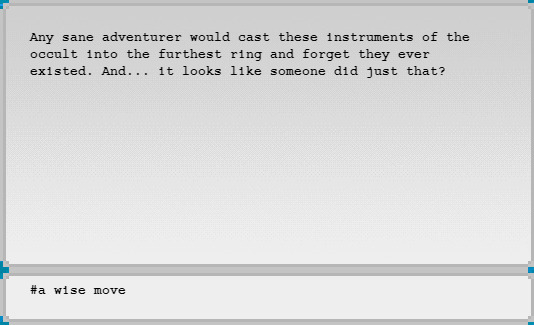
It’s a nice bit of callback humor that Meenah has the same reaction to discovering the Thorns of Oglogoth that Rose does, but unlike Rose, Meenah actually does destroy them on the spot.
For being so headstrong and dangerous, there are ways in which Meenah is really pretty surprisingly sensible.

Lord English can destroy ghosts - this has always been a pretty disturbing thought for me. I may have said something to this effect before, but if I haven’t I’m a free-thinking Theist - raised in the Church, and largely independent in terms of beliefs, but I’m still pretty convinced that there is some kind of life after death. It doesn’t bother me nearly as much in works that have final death as a general presupposition, but it always bothers me when some kind of eternal life after death exists in a setting, and can be arbitrarily denied by evil beings with some power or another, like how some Demons and Liches can destroy or devour a soul in Dungeons and Dragons.
In Homestuck though, it fits with the themes established by the ways in which everyone God Tiers - spiritual power can be pretty arbitrary, and generally signifies very little about the moral worth of the one who has it; it does not intrinsically elevate the one who has it. It fits with its general criticism of power and the powerful, whether that’s the Mayor’s hatred of Kings, or the associating of corporatism with the worst parts of Jane’s characterization and Crockercorp in general.
Lord English has the power to destroy ghosts and end the lives of immortals not because he has attained to any kind of heightened spiritual awareness. He’s just some douchebag who through cosmic serendipity was in the right place at the right time to become basically all-powerful.
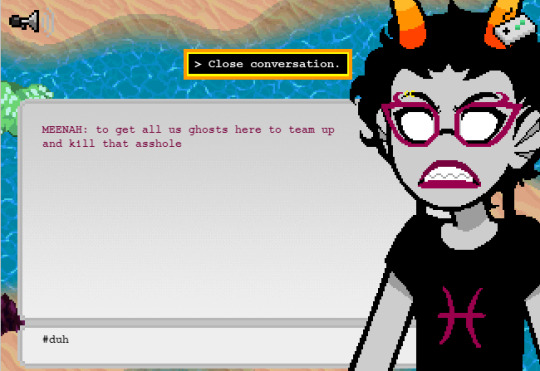
I adore Meenah’s spark. Who gives a fuck if Lord English is invincible? She knows exactly what she’s going to do when she gets her hands on him, and she’s got a plan from the outset. I think it’s also interesting the way that even though Meenah is absolutely taken by the spectacle of power, it isn’t sufficient to make her want to join up with English. Only soft power works on Meenah Peixes; emotional intimacy, friendship... keeping her entertained. All of these are the actual way to moderate her violent and dangerous personality.

While neither Rose nor Meenah is a parallel character to either Gendo or Rei from Neon Genesis Evangelion (I think, actually, that Dirk is the character who most strongly parallels both of them), this bit reminds me of the way that Ritsuko describes both of them;
Rose says of herself and Meenah, “You’re not very good at this, are you? ... talking to people.”
Ritsuko says of Gendo and Rei, “They’re not very adept (at)... living, I suppose.”
The same can really be said of a lot of characters in Homestuck, particularly the ones who primarily find their identity in some form of power-seeking. Whether it’s Rose, or Dirk, or Meenah, or even someone as innocuous as Jake, none of them is particularly adept at living.
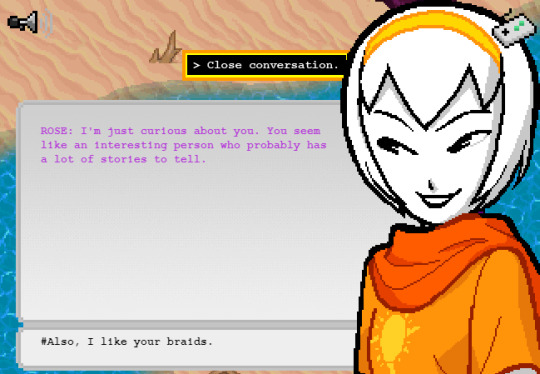
Rose is pretty conciliatory with Meenah; given her attraction to danger and darkness, it’s probably not surprising that she makes such an obvious pass at Meenah in spite of the fact that she probably knows what their relationship was in another life.
Further evidence that Rose is the horniest Homestuck character.
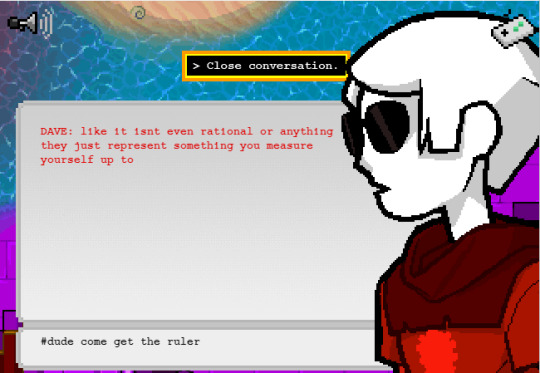
“you know how it is with ancestors
they just kind of hold this inexplicable power over you”
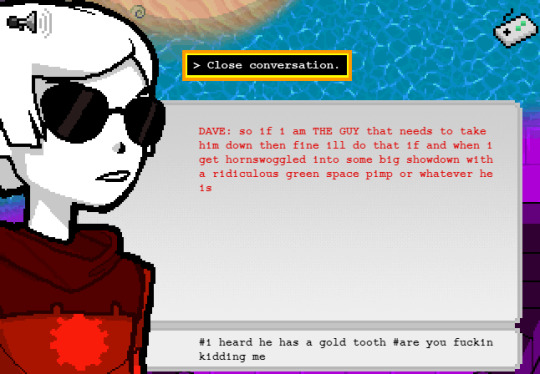
Dave continues to progress down the path of not giving a shit, as did Sollux before him.
He’s not quite to the level of reluctance that he eventually adopts, of choosing to just not engage with English at all.

Gods are, to some extent, aware of the various narrative forces that govern their existence.

About the only thing this piece of nasty trash has in common with Karkat is the extent to which they both blabber, and he helps create contrast with the other, somewhat more likable dancestors. Kankri is pretty much openly contemptible, and really in the worst way. I’m almost inclined to call him a concern troll because of the extent to which his verbal essays exist purely to make him feel better about himself. Any time it comes time for him to listen to people who historically actually suffered from the systems they were involved in, Kankri shows his true colors, slut-shaming and misogynistic.
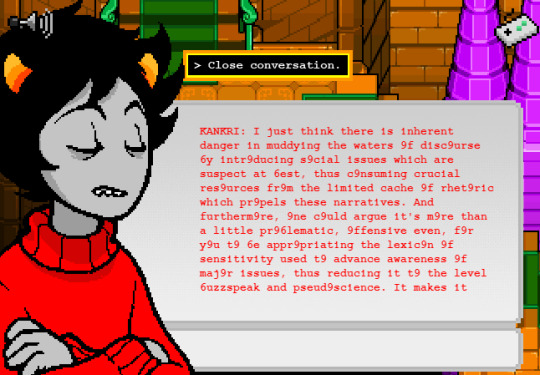
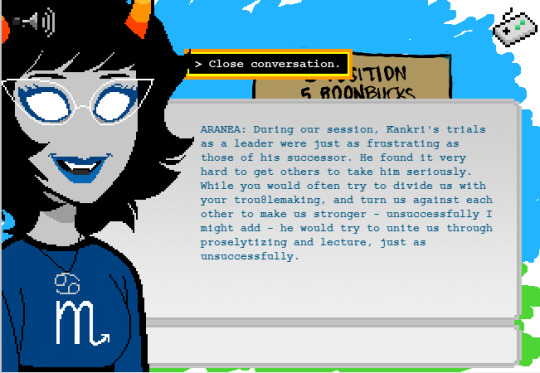
Unsurprisingly, The Other Thief is also the vector for English’s ideology in her session, “turning us against each other to make us stronger.” While Kurloz may be a worshipper of English, and Damara may have thrown in her lot with the demon because of her nihilistic despair, Meenah (rather like Dirk!) is clearly driven toward a life of violence, and restless action for its own sake.
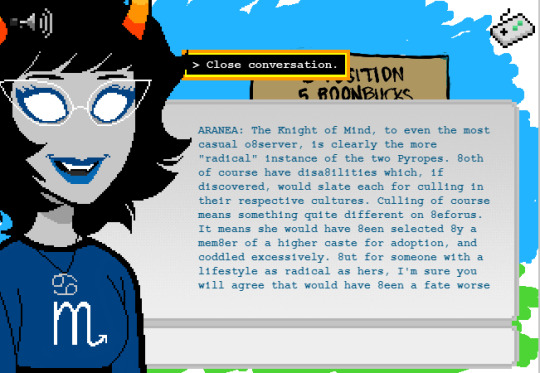
Now we’re starting to get some insight into Feferi’s style of rulership, which in turn, probably gives us some insight into Jane. For Feferi, leadership means taking power away from the people you’re leading if it seems like they have the potential to hurt themselves (or to be a drain on society if left to their own devices). It represents a violation of agency, perhaps not so severe as the kind that Vriska perpetrates usually.
Feferi and Jane are the sort of people, I think, who want to create a perfect world - but it’s important to them that they’re the one who’s creating that world, and less important that the world is perfect for anyone in particular. Just perfect.
https://homestuck.com/story/5288
John’s whole self-conception, and especially his conception of himself as a man, and someone who might be growing up to take on the same roles as his Father, is tied up in the icons of dadliness and masculinity in the movies that he likes.
So we should expect that his disillusionment with his past will change the way that he thinks about his future, and what he’s going to do with it. It’s a shame that this line of questioning never goes anywhere in Homestuck proper, but I’ll use it as evidence in the “John/June Egbert is trans” folder. Reminds me of how my decisive lack of affinity for the Boy Scouts serves as a nice little retrospective bit of evidence in my own trans narrative.
Based on the number of trans Eagle Scouts I know, I feel like there’s a certain extent to which it be like, a fast-track to figuring that out about yourself, like, you tried all the boy stuff and just decided, nope! Not for me.
https://homestuck.com/story/5290
Man, especially if we continue to read this section of Homestuck as conflating the characters and the audience, this whole section reads as John not just having a meltdown about Con Air, but also generally having a meltdown about his own story so far - everything he’s done in Sburb, etc. It just all feels lame and shitty in retrospect, when it was something that was kind of exciting at the time, at least up until the point where his loved ones all dropped dead there at the end.
It turns out that there was nothing particularly edifying about John’s suffering.
https://homestuck.com/story/5300
Teens can be such monsters. It’s the anniversary of Bro’s Death too. Davesprite is probably as broken up about that as John is about Dad, but it’s hard for boys/men to talk about that kind of thing with each other.
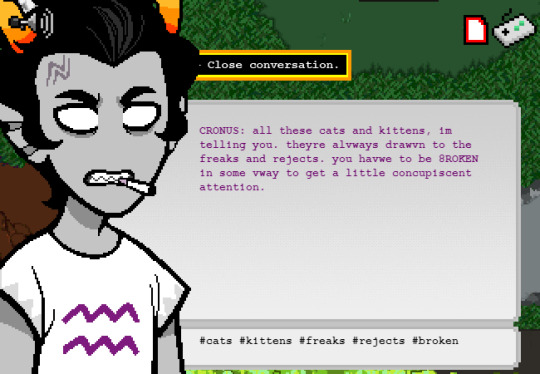
Cronus is even more of an incel than Eridan. He may be the most singularly contemptible character in Paradox Space. Do I hate anyone more than Cronus? No, I think I do not.
I won’t have a lot to say about the middle leg of Openbound; it’s relatively empty of substance, and not much that happens in it is ever relevant again compared to the first and second legs.
I like to think that this leg of the journey is, more than anything, a chance to ruminate on some joke characters who were already parodies; parodies of parodies, a joke made at the expense of an existing joke. The kind of thing Dirk Strider would write, basically.
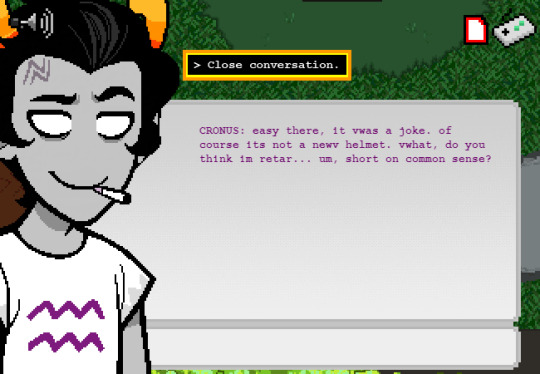
Hey check it out, the Year of Our Lord 2012, and Andrew was starting to show some mild sensitivity in his choice of words. Just mild enough to have the lowest character in the story show a tiny bit of sensitivity himself.

This leg of the adventure does give us some more insight into Meenah’s character. Just like Vriska, she’s all about being a hardass super-murder, until she starts causing problems for the people she actually cares about.
Being Evil Sucks.
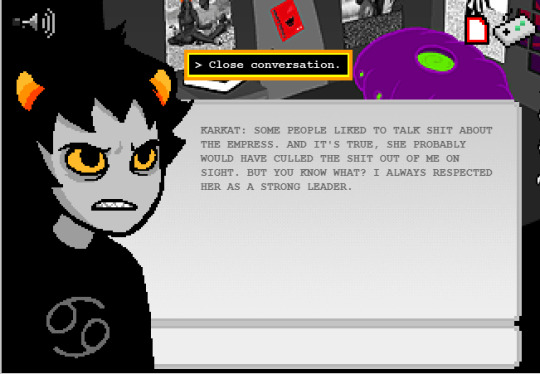
This is a really weird sentiment for Karkat to have in light of like, everything else about the latter half of the comic. I mean, he hasn’t exactly had the epiphany yet that the ideas that he has about being a leader are kind of awful and shitty, so it’s possible that he’s talking the Condesce up to avoid thinking about that. IDK.
He also immediately claims he’ll leave behind the meteor to go and join Meenah’s army, so maybe Karkat is just in a pretty low place in general? That tracks.
Karkat’s little conversation with Terezi explains at the two thirds mark of Openbound exactly what this whole thing is about.
Almost the entire second half of the comic is about examining the character’s guardians, and their relationships with them. The Guardians - Grandpa and Bro especially - are hyped up to be these outrageous badasses, both in-and-out of universe, and their ambivalent relationship with their kids creates this ambiguity throughout the comic about whether the kids are worthy, whether they’re living up to their parents’ legacy - and it’s the kind of thing that plagues them throughout.
But the thing is, Ancestors can be lame, or even terrible. They’re not really anything to aspire to, and the image of success that they project onto the world is one of learned confidence, and usually that only if they’ve really managed to make it.
Even the best parents are flawed, and instead of trying to measure up to them, growing up healthy usually means learning what those flaws are, and committing not to reproduce them.
Parents don’t suck; they can be awesome, and generally speaking, for a long part of our life, they’re all we’ve got. It’s hard not to love them. But we shouldn’t turn them into idols.
(On another note, it’s one hundred percent fitting for Terezi’s Ancestor to be an outrageous coolgirl. Terezi is perpetually anxious about being cool enough, the sort of person who is breathlessly fun to be around, who commands the attention of everyone around her, and she’s surrounded by them wherever she goes.)
https://homestuck.com/story/5340
John’s distress leads him to dream about his dead Dad, and boy is he angry. He spends a lot of the second half of the comic seething in rage directed at whomever is responsible for all the suffering he and his friends endure, dishing out beatdowns toward those responsible, but I’ve never gotten the impression that these little outbursts of his are particularly rewarding for him.
https://homestuck.com/story/5358
That was quite a blow. He knocked out like a tenth of Jack’s health bar.
https://homestuck.com/story/5387
Depending on where you’re standing some really totally different things can matter to different people. From Vriska’s point of view, the things that happened back when she was alive totally don’t matter at all anymore - only the matter of Cosmic importance that is fighting Lord English.
But the stuff that matters to the people she left behind, and the suffering she’s responsible for - especially for putting Terezi in a position where she had to slay her - all of that still matters very much to the people who are alive, which is what makes her self-conception as someone who is on the side of the angels now really... not sit well.
She clearly hasn’t changed all that much. She just thinks, as usual, that now that things are even, now that the score is settled, things can go back to the way they were before.
https://homestuck.com/story/5388
Tavros and Vriska are really bad for each other in general. Like, it’s not good for her to be around someone as pliable as Tavros is, and it’s plain to everybody that it’s not good for him to be around her either; whenever he’s around her, he apes her bogus inflated self-esteem in all the worst ways.
https://homestuck.com/story/5397
Tavros’ explanation of what Vriska does suggests that storytelling has become kind of a ritual for her - a means by which she is attempting to connect with her Ancestor, by performing the same actions she is, miming her - still the same old Vriska.
That’ll be all for now. Cam signing off for now - join me for the thrilling conclusion to Openbound tomorrow, Same Cam Time, Same Cam Channel.
8 notes
·
View notes
Text
So after nearly 22 years of life on this planet, I’ve come to the conclusion that I am high functioning autistic. I believe I fell through the cracks of an early diagnosis for the following reasons:
1.) I am Female (I learned how to mask myself very early on)
2.) I have a gifted IQ (above 130) and was classified as such in 4th grade so no one considered that I could be both ASD and intellectually gifted.
I am in the beginning stages of unmasking and am currently seeking an official diagnosis. Right now, I’m trying to write down everything I know about my neurodivergent experience so here’s a list of things I’ve experienced and believe to be relevant. If you can relate or you understand please comment and share! I’m new to this community and it feels so good to finally meet people who understand and can relate. Ok, Here we go.
“So the general population doesn’t memorize scripts to movies or watch the same one every day for a year?”
“People think it’s weird that I prefer to have subtitles on when I watch stuff, even though I don’t have damaged hearing”
“I watch movies with subtitles because I won’t understand what’s said if I don’t read it. I have no hearing issues.”
“I cannot hear/understand someone if I have one ear bud in and one out. Too much sensory input at once.”
“I thought I had a hearing deficit because I literally could not understand people at church or parties or other places with a lot of background noise, and I was so confused when they told me my hearing was normal.”
“I love star wars. Not just love but I could tell you what planet each character is from and what kind of ship they use, what model droid that one is and I will gladly talk about it all day if you let me. Everyone now gets me Star Wars stuff for my birthday and holidays”
“Eye contact is so uncomfortable for me that sometimes it ‘burns’ to maintain it, but then I overcompensate and stare too intensely. Over the years, being female, I’ve forced myself to make eye contact for a certain number of seconds and then look away a certain number of seconds but I’m concentrating so hard on that, that I don’t remember anything that was said to me.”
“Giving me verbal directions is a special kind of hell. I need it written down.”
“I can memorize pictures of things and exactly where every kid sat in my 10th grade US history class as well as my 9th grade geometry class.”
“I never fit in anywhere, in my childhood, most of my adolescence, except the swim team and my new church.”
“Team sports are the worst. I can’t communicate fast enough, I’m bad with hand eye coordination and keeping track of a ball. I excelled in individual sports and fell in love with swimming.”
“I often found it much easier to make friends with older kids because I could have intelligent conversations with them and their good social skills could make up for my lack of social skills.”
“But, I had a few friends that were considerably younger who I could still play imaginatively with dolls when I was 13 and one particular friend was 9. I had a lot of trouble getting a long with her sister who was the same age as me.”
“It physically pains me to hear someone mispronounce a word, spell something wrong, or make a grammatical mistake. I corrected my cousin A LOT when we were kids, she frequently got mad and I couldn’t understand why. My grandma would tell me to stop because correcting people is rude.”
“One of my special interests as a kid was dolphins. I was 5-6 years old and I remember being so excited when my mom let me check out like 10 books from the library and I read them quickly and multiple times.”
“I corrected a teacher one time about dolphins. She said dolphins weren’t whales and I knew FOR A FACT that ‘dolphins were a type of small whale’ because I read it in one of my books. She laughed at me and so did the rest of the class and I felt stupid even though I was right. This led to me suppressing my knowledge and real self and ultimately more masking.”
“As per that last one, my memory is impeccable.”
“I had another special interest in dogs when I got a bit older. My mom bought me a book with every kind of breed of dog, where they came from, their temperament, their size, everything. I can still, to this day, tell you the breed of dog just by looking at it.”
“I always wanted a best friend but never had one. I had groups of friends but never someone who would call me their best friend. When I got a boyfriend in high school, I was so excited because he called me his best friend and he was mine and I finally had that feeling reciprocated. He also had a gifted IQ and dyslexia, ADHD and a few other things so we understood each other quite well.”
“I can’t tell if someone is flirting with me because I can’t read between the lines. I also don’t know how to flirt because if I like a guy too much I get soooo nervous and I stumble over my words and it’s a disaster.”
“When I liked this guy (last year, 2019) I would freeze up so bad when I talked to him that I rehearsed every conversation I wanted to have with him so I wouldn’t mess it up. I would write topics in the notes section of my phone before hanging out with him so I’d remember what to ask him. It made for very awkward and forced conversations and probably drove him away.”
“Sarcasm and jokes almost always go over my head. The boyfriend I had in high school was very funny and outgoing but used a lot of sarcasm and it always caused disagreements because I took him seriously when he was being sarcastic.”
“I talk slowly and very monotone.”
“I have no difficulty reading in my head and can read/comprehend it well, but reading aloud is difficult and I often stumble over words and mess up.”
“I need directions repeated multiple times before I understand.”
“I went to the beach to hang out with some church friends yesterday. They all play spike ball and are so confused as to why I sit there and don’t play. I’ve tried playing spike ball but it involves way too much hand eye coordination and I’m so bad at it that it’s embarrassing. So I don’t play.”
“That same night, a group of them said ‘let’s play uno!’ And I was so happy to play something familiar that didn’t involve a lot of coordination. Then they said ‘we’re playing SPICY uno, right?’ And immediately my heart sank because I knew they were playing a different way that I wasn’t familiar with. Again, receiving verbal directions was hell and I didn’t understand it. I was so bad at it and wasn’t getting it, and in the middle of the game I had the urge to cry. I wanted to cry because I couldn’t even get this right. I suppressed the urge, of course, so they wouldn’t think I was even more weird than the already suspected. Another group of people that I wouldn’t fit in with.”
“Making friends has always been so difficult. Once I make a good friend I hang on to them for as long as possible even if they’re not very nice because I’m scared I’ll have to make a new one if I lose them. And we all know how hard making new friends is for me.”
“I’m a perfectionist. Especially with my art projects. When I took a painting class I realized I do it the wrong way. You’re supposed to paint layer by layer over the entire canvas and focus on small details at the very end. I work on one small area at a time and do small details too soon. I often spend way too much time on small details before I realize that the larger shape of the object isn’t proportionate and then it’s too late.”
“I won’t even attempt tasks if I know I can’t do them perfectly.”
“I have perfect pitch. I don’t know if that has anything to do with autism or that I just started music lessons when I was young. I can tune instruments perfectly without a tuner or reference note and I never understood why my orchestra teacher had me play the A key on the piano over and over again while she walked around and tuned everyone’s instruments when I could do it without any reference. I can hear it in my head.”
“When my parents got me a keyboard at age 7-8, they were impressed because I could sit down, without listening to any song and find the notes of a song I liked by ear. I still do that today but my piano is very out of tune and it bothers me.”
“Autistic boys tend to isolate and not care about concealing their stims or weird behavior but girls don’t. I am a ‘loner’ and always have been but I want so badly to belong and have friends and socialize, but I’ve always been so bad at it that I strike out every time. I often drink at social gatherings because it helps me loosen up and talk more freely. I guess it helps me lose the mask for a while.”
“I HATE people touching me. I’ve always hated it and still hate it to this day unless it’s someone I’m super comfortable with. I’ve been told I have the ‘dead fish hand shake’ and I’m an awkward hugger. My friend picked me up from behind and carried me for a few seconds because we were all goofing off and having fun but afterwards I was so mad at him I got really quiet and didn’t talk for a while. I told him later on the ride home that if he did that again I would slap him. “
“Everyone thinks it’s weird that I don’t like touching people, and some of my friends who also don’t like touching people were abused and I always thought, ‘there had to be a reason, maybe I was abused as a kid and repressed it.’ It’s been so long and I’ve finally realized that maybe it’s just because I have Aspergers or ASD. “
“When I make sarcastic remarks or jokes I often have to clarify because I say them in such a monotone way that people think I’m serious.”
“I’ve always joked that I’m just really clumsy and uncoordinated, and chalked it up to being tall and lanky. That’s why swimming was the perfect sport for me. Little to no risk of injury and not much hand eye coordination needed to be good at it. Just hours of practice, technique and endurance.”
“I also injure myself quite a lot because I’m ‘a klutz.’”
“Stims: I scratch my head and then smell my fingers and I will do this for hours if I am able (I know that one is weird so I only do it at home) popping my knuckles a ridiculous amount of times when I feel uncomfortable and don’t know what to do with my hands. I twirl my hair constantly (that one is pretty socially acceptable so I do it in class nonstop). I tap my foot or bounce my leg, I make weird facial expressions and forget to hide those. People notice but they often think it’s funny because I’ll make a face if someone says something dumb and make an expression that people seem to relate to. I scrunch my nose if I’m uncomfortable or just whenever.”
Special interests: Star Wars, Disney (I know every word to every Disney song and I watch animated Disney movies over and over again, like literally every night) dolphins, the ocean, dogs, theology/the Bible.
“With my art work, and other things, I will get so focused on a painting that I will work non stop for 8-9 hours (all day basically) and not eat because I’m so focused that I forget to eat.”
“I think I slur my words a lot and sometimes my friends will laugh and be like ‘did you just say ____.?!?!’And I’ll clarify and they will continue laughing and say ‘oh it sounded like you said this.’ I hate when that happens.”
“Loud noises really bother me. I jump if I hear an unexpected loud noise and I hate people yelling, even if it’s not directed at me, it makes me want to cry. “
“I loved the color blue so much as a kid (I still do) but my entire wardrobe was basically different shades of blue t-shirts. I also only ever wore baggy t-shirts and baggy cargo shorts (I kinda dressed like a boy) because it was comfortable and I didn’t like getting comments if I looked “cute today”. I hated the attention. I also never ever wore my hair down to school. It always had to be up in a tight pony tail. I still don’t like my hair being in my face to this day and wear it up almost every day.”
“The other day, I was hanging out with a friend and she was trying to tell a story but I kept getting distracted and interrupting her. She said, ‘Emily, you kind of interrupt people a lot.’ At first I was hurt, but then I realized it’s not entirely my fault and it’s an autistic thing.”
“I mask so much that I have rehearsed responses to social interactions and will often get so nervous or start speaking from the script before I realize I’ve said the wrong response. Of course I’ll think about it all day after that and think of ‘well great, so and so thinks I’m weird now.’”
52 notes
·
View notes
Text
Clover Ebi is Important
I was inspired to write this after seeing posts where people suggested that Clover was a “nobody” in-universe and that we were never supposed to care for him as a character. Clearly quite a few of us think otherwise, and I wanted to go into detail on why that’s the case. I’ll be primarily focusing on how the show used framing to set Clover up as an important character who we should pay attention to, while also touching on how Clover is shown to fulfill a high-level role in-universe in the Atlesian military. I previously discussed Clover’s role in the trailer for volume 7 and that post can be found here.
Clover and the Ace-Ops
For this section, we’ll mostly be discussing how Clover is given more focus than the other Ace-Ops in terms of both framing and screen time. Fun fact, a reddit user who ranks the word count of each character in RWBY found that Clover had 1,259 words this volume. So, what exactly does that mean? For starters, it means that Clover spoke more words than all of the other Ace-Ops combined, who add up to 1,176 words among the four of them. It means that Clover has the 22nd highest word count out of all characters in the series and it means that he has the highest word count for any character who has only appeared in a single volume, beating out Jinn by 27 words. It also means that Clover, in one volume, has spoken just under 100 more words than Penny Polendina, our winter maiden, has spoken in the entire series. The reddit user also found the characters with the top three word counts per volume, and Clover had the second most words spoken this volume, only beaten out by Ironwood. None of this seems fitting for an “unimportant” side character.
With that said, we’ll start by looking at episode 1 and Clover’s introduction to the show before we dive into the opening.

Our first shot of the Ace-Ops has Elm, Vine, Marrow, and Harriet looking off-frame at what we soon find out is Clover. From the very beginning, Clover is shown separated from his team as the leader, and most relevant member of the Ace-Ops. He’s established as the one they look to for orders.
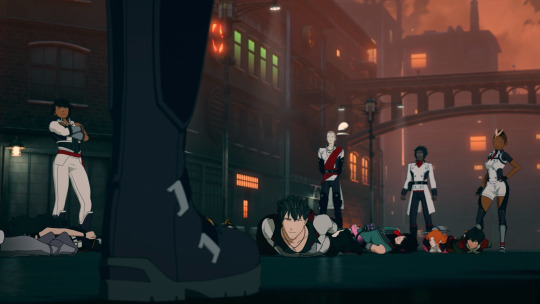
When Clover finally comes into frame, we have not one,
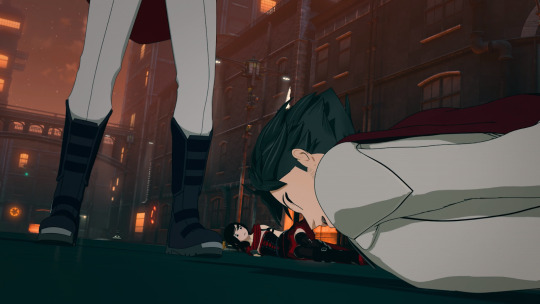
not two,

but three shots of him before we see his face.

You don’t build up to a character reveal for someone considered irrelevant.

The rest of the scene sees Clover handling the relic and explaining why the Ace-Ops have been called to Mantle. Pietro asking what the Ace-Ops are doing down in Mantle suggests that this sort of work would likely be below their pay grade, that the Ace-Ops are expected to be undertaking more important missions. It should also be pointed out that Clover is the only Ace-Op who speaks in this entire episode. While he’s given more characterization in episode 2, Clover’s establishing character moment happens in episode 1. We’re shown that he’s the confident, collected leader of a group high up in Atlas’ military.
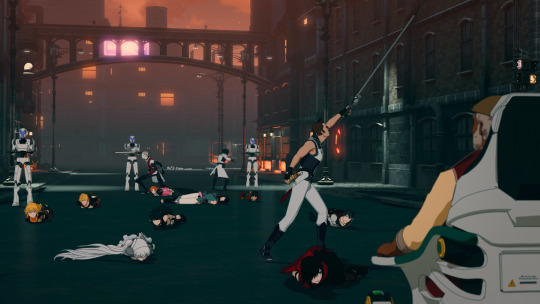
Even the end of the scene focuses on Clover. The Ace-Ops move in separate directions when they leave, but the scene follows Clover as he heads off.
The opening only serves to reinforce the idea that Clover is narratively important.
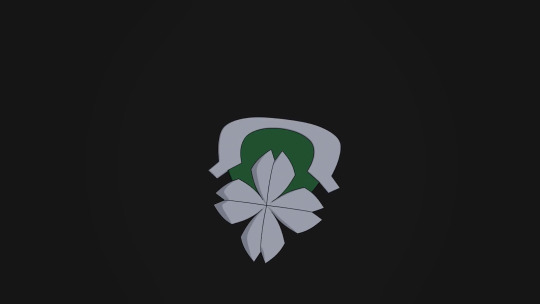
His badge is shown on-screen alone, before Clover’s hand appears and grabs it.

The screen then goes green except for Clover’s hand, and the following shot of all of the Ace-Ops establishes this green as Clover’s color.
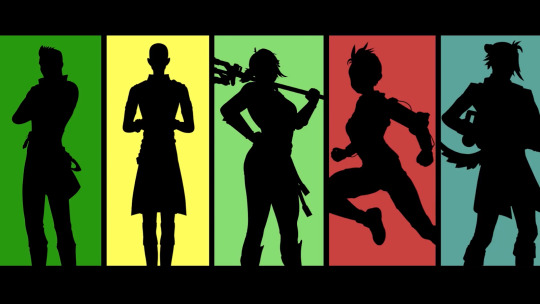

Just as interesting is the proper shot of the Ace-Ops. Unlike episode 1, this shot opens with only Clover present at first.
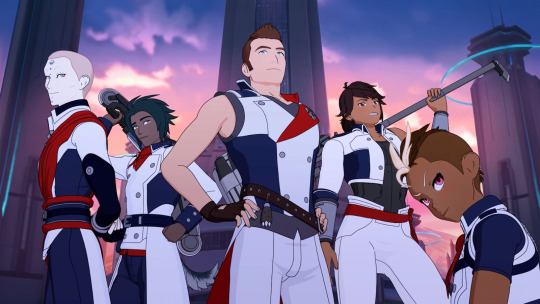
He moves slightly before the other Ace-Ops fade in. It’s interesting to note that we’re shown Clover without the Ace-Ops, not the other way around. If CRWBY wanted to foreshadow episode 12, they could have just as easily had Clover appear after the other Ace-Ops. This would have shown the other Ace-Ops without Clover, instead of showing Clover on his own. The opening clearly singles Clover out, giving him a level of focus not shown with the other Ace-Ops.
This continues to be shown in episode 3, where Clover’s fighting abilities are shown off against the Geist.

We get a whole sequence of Clover jumping into the fight and taking action to separate the Geist from its body.

The sequence even warrants a shot of all four members of RWBY watching in awe as Kingfisher’s line wraps around the Geist’s mask.
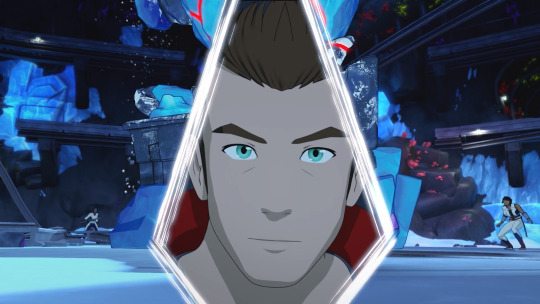
When the Ace-Ops get their cut in, the shot starts with Clover before adding in all of the other Ace-Ops at once. For comparison, the RWBY shot (which happened only 10 seconds earlier in the episode) had Weiss and Yang appear on the outside before having Ruby and Blake appear in the middle. No team member appeared by themself, unlike with the Ace-Ops.
To say Clover was given the same significance as the other Ace-Ops is to ignore the repeated framing of Clover by himself instead of with the other Ace-Ops. He was always meant to stand out and be the Ace-Op we focused on.
Clover and the Military
Clover is also shown to operate on a totally different level of the military structure than the other Ace-Ops. While they were all trusted with Ironwood’s secrets, Clover is clearly higher up the chain of command.
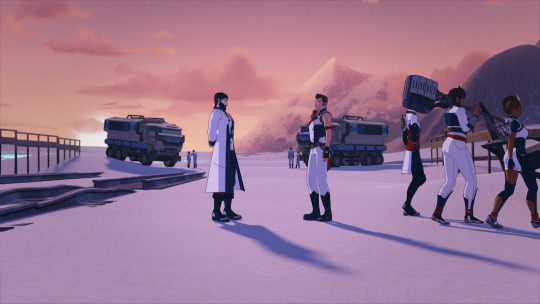
He’s shown staying behind to discuss plans with Ironwood even when the rest of his team is dismissed,
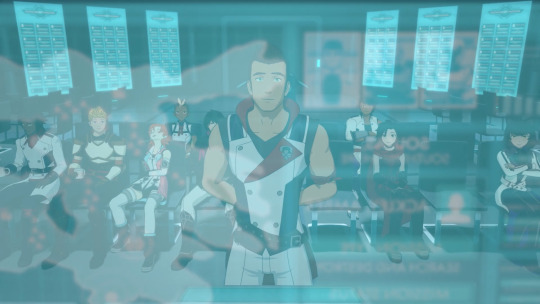
he leads the briefings,

and he’s chosen to accompany Ironwood at the Schnee Dinner, alongside Winter and Penny.
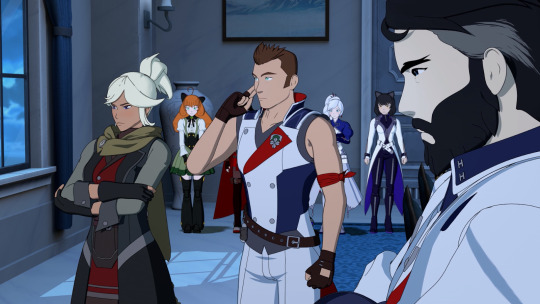
Particularly interesting is a moment in Ep9. When Mantle is being swarmed with Grimm, Clover’s the first one to hear about it. Not Winter, not General Ironwood, Clover. Mantle’s at risk of collapse and Clover is being contacted before Ironwood is.

He’s then the one leading the charge to save Mantle, shown by him literally leading our heroes out of the dining room, with even Winter following him.
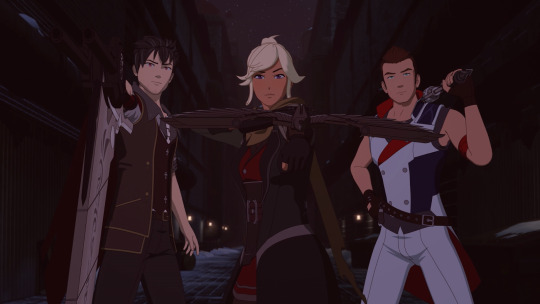
He’s also chosen to help fight Tyrian alongside Qrow and Robyn. Ironwood would want someone competent and trustworthy leading the charge against Tyrian, considering his current stress over Salem’s forces being present in his kingdom, and Clover fit that perfectly.
Clover is one of the two most powerful people in the military outside of Ironwood, the general. Considering the strength of the Atlesian military, that’s by no means an insignificant role. He’s who soldiers are contacting in a time of crisis and he’s the one leading the charge to save Mantle. That doesn’t sound like the job of a “nobody.”
Clover and Qrow
I don’t think I need to explain why Qrow is an important character in the overall plot of RWBY. He’s one of Oz’s most trusted men and one of the strongest fighters in Remnant even without his magical abilities. He’s also someone who has been defined by his choice to push others away and be alone. Prior to volume 7, most of his interactions were with Ruby, his niece who has been shown to look up to him for most of her life, and many of his interactions outside of that weren’t exactly friendly. We’re shown that Qrow tends to be abrasive towards others, both because he doesn’t fully trust them and because he worries about putting them in danger due to his semblance. Ozpin even refers to it as a “fear of growing close to someone.” Yet suddenly, volume 7 starts and we see Qrow not only interacting with someone new, but also getting close to him in a way we haven’t seen with Qrow and any other characters. The volume after Qrow hit rock bottom, Qrow has his first healthy on-screen relationship outside of his nieces, with most of his screen time being dedicated to developing this relationship.
Volume 7 stressed Clover’s importance through his connection with Qrow even before they had a proper conversation. If you’ll remember from the start of this post, the first time we see Clover is from Qrow’s perspective.

Episode 3 is where RWBY begins to properly set up Clover as Qrow’s partner. We’re shown that the two of them have been paired off, working as a team of two while the other two teams consist of two Ace-Ops members and three to four younger huntsmen. Qrow’s first proper conversation with Clover has him commenting on how he’s not used to working with others again, as he’s been on his own for a while now, which Clover says is a shame. He then catches Qrow when he falls, showing that Qrow does benefit from having someone else alongside him in the field.
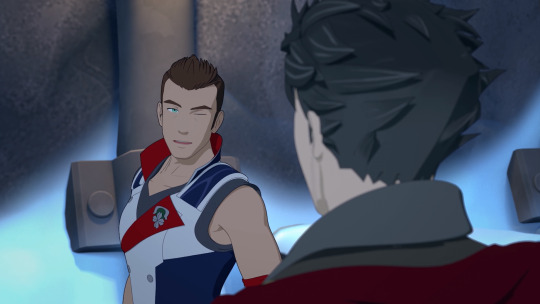
Lucky you, huh?
Qrow’s luck semblance has been special for a while now. It lacks the physical nature of most of the other semblances (ex: glyphs, speed, aura disruption) and hasn’t been explored much yet. And suddenly, here we have someone whose semblance is a perfect foil for Qrow’s. This could’ve easily been a point of contention, but we’re never shown anything suggesting that Qrow resents Clover for his semblance.
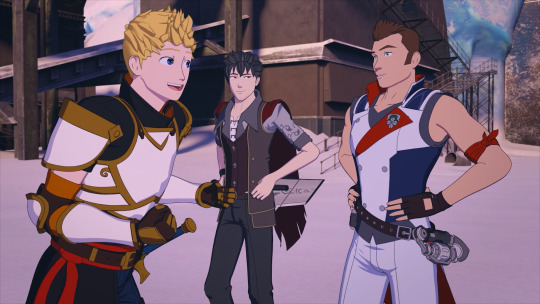
Clover’s semblance is especially important considering his line in the next episode: “Ace-Ops are hand-picked to perfectly complement each other.”
Elm can root herself in place, while Vine can propel himself using aura vines. Harriet has super speed, while Marrow can freeze enemies in their tracks. The Ace-Ops have opposite semblances and Clover has just worked with someone who has the opposite of his semblance.
It’s also worth noting that while Qrow is included in the frame while Clover says this, Qrow plays no role in this conversation. He’s just there to look at Clover while Clover talks about complementary partners.
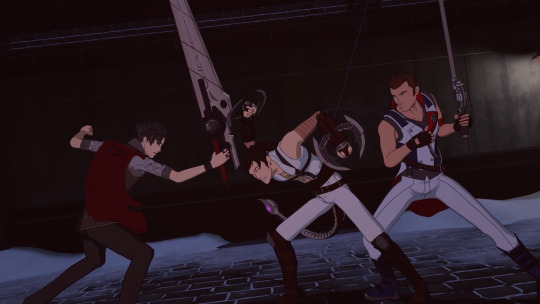
They’re also shown to have complementary fighting styles, with Clover prioritizing disabling opponents over going in for the kill (also seen in the fight with the Geist, where he pulled it out of the ice so Harriet could kill it), while Qrow is the damage-dealer. Their fight against Tyrian has Clover twice wrap Kingfisher around Tyrian to let Qrow get a strong hit in.

Clover and Qrow are also complementary outside of their semblances and fighting styles, perfectly illustrated in the truck scene. Qrow is pessimistic and jaded, while Clover is optimistic and genuine. Clover helps convince Qrow to stop deflecting compliments and putting himself down and Qrow lets Clover have a chance to relax and make jokes instead of always acting the part of a cool, professional leader. It’s by far the healthiest relationship we’ve seen Qrow have with someone his own age. It also parallels Blake and Yang and Ren and Nora, two sets of partners (both in terms of battle and romance) made up of people with contrasting personalities.
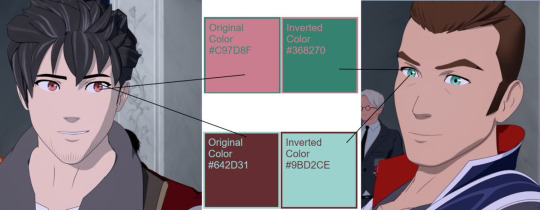
Their eye colors are also the inverse of each other, a pattern seen again with Blake and Yang and Ren and Nora.
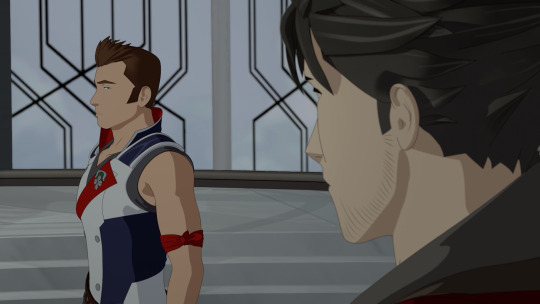
Throughout the volume, the focus on Qrow or Clover is often shown from behind the other’s shoulder, putting both of them in the frame. One example is in episode 7, in Ironwood’s office, where we’re shown Clover’s response to Ironwood from over Qrow’s shoulder, including how Clover briefly looks to Qrow during this. It’s also interesting to note that Clover’s response to Ironwood demanding the arrest of Robyn in this moment is to say “we’ll figure it out,” while looking at Qrow. A bit unusual for a military man who is supposed to always be following orders.
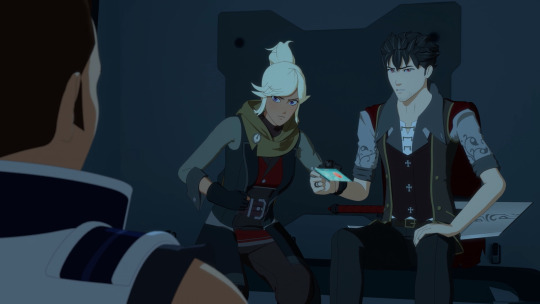
The end of episode 11 features the same framing, with Qrow being the focus this time. It’s important to remember why so many of us were caught off-guard by the start of episode 12 after seeing this moment; Clover had been separated from the other Ace-Ops to be placed with Qrow. It was a pattern we had seen all volume, emphasizing Clover’s relationship and partnership with Qrow over his other connections, so of course we all assumed he was set up to side with Qrow in this moment. Looking at what seemed to be foreshadowing regarding his role with the Ace-Ops and his partnership with Qrow, many of us thought he’d be leaving the Ace-Ops behind to join our main cast.
Orders vs Morality
Clover’s relationship with Qrow also played into the orders vs morality character arc he seemed set up for. Who better to convince a soldier to rebel than Qrow Branwen, notable hater of the Atlesian military?
Clover is never shown to be someone who follows orders without thinking for himself. In episode 2, he apologizes to team RWBY for arresting them, despite the charges against them having been accurate. He could’ve told them off for stealing a plane and using their weapons in a city without licenses, but he instead tried to make amends. In episode 5, he wishes Robyn luck in the election even after she almost had the Happy Huntresses attack the truck, only calling them off after Penny asked her to stop. There’s also his line in episode 7, which we’ve already discussed, alongside how he sees Robyn, who still has an arrest warrant out for her at this point, in episode 8 and makes no move to arrest her.

There’s also this look in episode 10, right after he receives orders to switch from fighting Grimm to joining Robyn in defeating Tyrian. We’re immediately shown him looking at the Grimm swarming the sky before telling Qrow that they need to hurry. He might be following orders and prioritizing Tyrian, but he’s also concerned about the attacking Grimm and wants to return to protecting civilians as soon as possible.
While episode 12 abandoned this set up, it would likely come back into play if Clover is revived in volume 8. In two volumes with a heavy focus on orders vs morality, RWBY has yet to use this arc and Clover remains the best candidate for it. The other Ace-Ops haven’t had enough focus to warrant a developed arc. Winter has been defined by her loyalty for Ironwood since volume 3. Penny was always loyal to the kingdom, not to Ironwood specifically. Her arc has been about making her own decisions, not about having to decide between following orders and doing the right thing. If RWBY wants to talk about trust and trusting love, having Clover come back and choose to trust Qrow, his partner, over following orders would be a perfect way to showcase these themes in a positive light.
Conclusion
In addition to being an important person in the Atlesian military structure, Clover was clearly framed in a way that told viewers to keep an eye on him. He spoke more than his four team members combined, he was shown to be the complementary partner to a character connected to RWBY’s main plot, and he was set up for an important character arc. Clover isn’t just another side character and if we’re lucky, we’ll get to see all of this setup pay off in volume 8 with a Clover revival.
148 notes
·
View notes